Hindu Of Universe
Hindu Gods
It is believed that there are 330 million gods in the Hindu Dharma. There are
as many Hindu gods as there are devotees to suit the feelings, moods and social
background of the devotee. However, it is not really the sign of ignorance. The
ultimate reality is one, the almighty. The omnipresent God is a universal fact
and having different names show the branches of the same tree. You will find
each and every branch cropping up from the same tree. Similarly God is one,
there can be different forms or physical appearances but the ultimate reality is
one.
In Hindu religion, there are many gods. Here we will discuss some of the popular
Hindu gods.
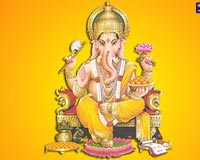 Brahma,
the Creator Brahma,
the Creator
Brahma is considered as the first god of the Hindu Trinity, the other being
Vishnu and Shiva. Lord Brahma is recognized as the creator of the Universe.
Brahma is regarded as the Supreme Being, the god of gods. Lord Brahma is the
originator and the generator of the mankind.
Bhairav
Lord Bhairav is considered to be the incarnation (Avatar) of Lord Shiva. In the
contemporary times, Bhairav has been worshipped by millions of people to get the
powerful blessings from the god. Bhairav is a fierce form of Shiva.
Ganesha
Lord Ganesha is the god of beginnings, knowledge, wisdom, intellect and
eradicator of obstacles. Lord Ganesha is the child of lord Shiva and goddess
Parvati. He is the elder brother of lord Kartikay (Skanda/ Murugana). Ganesha is
the most extensively worshipped god in Hindu way of life.
Lord Hanuman
Hanuman is considered to be an avatar (incarnation) of Lord Shiva. Shri Hanuman,
a great disciple of Sri Rama, is the symbol of devotion and dedication. Lord
Hanumana is the provider of courage, hope, knowledge, intellect and devotion.
Lord Rama
Lord Rama is known as the seventh incarnation of Lord Vishnu. Rama, the perfect
avatar of the Supreme Protector Vishnu, has always been popular among the Hindu
deities. Rama is the symbol of courtesy and virtue, a man of values and morals.
Lord Krishna
Lord Krishna is one of the most popular and worshipped deities of the Hindu
religion. Krishna is considered as the eighth avatar of Lord Vishnu, the divine.
Shri Krishna is the very embodiment of love and divine ecstasy that destroys all
pain and offense.
Shiva, the Destroyer
Lord Shiva or Siva is considered as the destroyer of the world. Shiva is one of
the most popular gods of the Hindu religion. Lord Siva forms the part of the
Trimurti (Trinity), the other being Brahma, the creator and Vishnu, the
preserver respectively.
Surya
The Sun God As per the Hindu Religion, Surya symbolizes the Sun God. Surya is
considered as the only visible form of God that can be seen every day. God Surya
is regarded as an aspect of Shiva and Vishnu by Shaivites and Vaishnavas.
Vishnu, the Preserver
Lord Vishnu is considered as the chief god in Hindu religion and Indian
mythology. Vishnu, the preserver, forms the part of the trinity while the other
two being Brahma and Shiva, respectively, as the creator and destroyer of the
universe.
Ganesha
|
Characteristics : |
Knowledge, Eradicator of obstacles. |
|
Other Names : |
Ganapati, Gajanana, Vinayaka, Vighneshawar, Pillaiyar |
|
Principal Scriptures : |
Ganesha Purana, Mudgala Purana and Ganapati Atharvashirsa |
|
Consort : |
Riddhi (affluence) Buddhi (knowledge) Siddhi (perfection) |
|
Vahana (Vehicle) : |
Mouse |
|
Mula Mantra : |
Om Gan Ganpatye Namah |
Lord Ganesha is the god of beginnings, knowledge, wisdom, intellect and
eradicator of obstacles. Lord Ganesha is the child of lord Shiva and goddess
Parvati. He is the elder brother of lord Kartikay (Skanda/ Murugana). Ganesha
is the most extensively worshipped god in Hindu way of life. Each sort of
worship whether tantric or spiritual starts with the prayers of Ganesha in
Hinduism as he is known as the eradicator of obstacles (Vighneshawar). He is
worshipped in the starting of any propitious event for blessings and
hassle-free work. Lord Ganesha is invoked as the "Patron of Letters" at the
beginning of any writing.
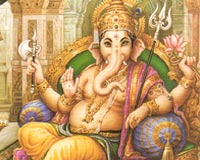 Ganesha
Image Ganesha
Image
Ganesha figures show extensive variation with dissimilar patterns changing
over ages. A different mixture of his elephant-like head, a pot belly and a
small mouse makes him different from all other Hindu gods in appearance. Many
a times, he is represented standing, sitting, dancing, like a warrior in
heroic action against demons, playing with his family as a boy, sitting down,
or in a significant range of contemporary situations when depicted in festival
displays.
Ganesha has four hands, holding an axe in the right upper arm, while the left
upper arm holds a noose, signs of his ability to cut through obstacles or to
create them as required. In the third one he carries laddoo (a sweet delicacy)
and the fourth hand's palm is always there to bless people. His vahana is a
tiny mouse which represents the dominated demon of pride and impertinence.
Ganapati Gayatri Mantra
Aum Ekdantaya Vidmahe
Vakratundaya Dheemahi
Tanno Danti Prachodayat
Different Names of Ganesha
Lord Ganesha is considered as the remover of obstacles and the lord of
beginnings. Shri Ganesh is one of the most popular gods among the followers of
Hindu religion. Ganesha is also known as the Elephant God. Lord Ganesha is the
primary god, one who is worshipped at the beginning of any propitious event.
Ganesha is the lord of intellect and knowledge. Ganesha is also invoked as the
"Patron of Letters" before starting any writing. Shree Ganesha is known by
many different names. Chanting of different names of the lord Ganesha is
considered auspicious. This list contains 108 Names of Lord Ganesha with their
meanings:
|
Name |
Meaning |
|
Akhuratha |
One who has Mouse as His Charioteer |
|
Alampata |
Ever Eternal Lord |
|
Amit |
Incomparable Lord |
|
Anantachidrupamayam |
Infinite and Consciousness Personified |
|
Avaneesh |
Lord of the whole World |
|
Avighna |
Remover of Obstacles |
|
Balaganapati |
Beloved and Lovable Child |
|
Bhalchandra |
Moon-Crested Lord |
|
Bheema |
Huge and Gigantic |
|
Bhupati |
Lord of the Gods |
|
Bhuvanpati |
God of the Gods |
|
Buddhinath |
God of Wisdom |
|
Buddhipriya |
Knowledge Bestower |
|
Buddhividhata |
God of Knowledge |
|
Chaturbhuj |
One who has Four Arms |
|
Devadeva |
Lord of All Lords |
|
Devantakanashakarin |
Destroyer of Evils and Asuras |
|
Devavrata |
One who accepts all Penances |
|
Devendrashika |
Protector of All Gods |
|
Dharmik |
One who gives help |
|
Dhoomravarna |
Smoke-Hued Lord |
|
Durja |
Invincible Lord |
|
Dvaimatura |
One who has two Mothers |
|
Ekaakshara |
He, of the Single Syllable |
|
Ekadanta |
Single-Tusked Lord |
|
Ekadrishta |
Single-Tusked Lord |
|
Eshanputra |
Lord Shiva's Son |
|
Gadadhara |
One who has The Mace as His Weapon |
|
Gajakarna |
One who has Eyes like an Elephant |
|
Gajanana |
Elephant-Faced Lord |
|
Gajananeti |
Elephant-Faced Lord |
|
Gajavakra |
Trunk of The Elephant |
|
Gajavaktra |
One who has Mouth like an Elephant |
|
Ganadhakshya |
Lord of All Ganas (Gods) |
|
Ganadhyakshina |
Leader of All The Celestial Bodies |
|
Ganapati |
Lord of All Ganas (Gods) |
|
Gaurisuta |
The Son of Gauri (Parvati) |
|
Gunina |
One who is The Master of All Virtues |
|
Haridra |
One who is Golden Coloured |
|
Heramba |
Mother's Beloved Son |
|
Kapila |
Yellowish-Brown Coloured |
|
Kaveesha |
Master of Poets |
|
Kirti c |
Lord of Musi |
|
Kripalu |
Merciful Lord |
|
Krishapingaksha |
Yellowish-Brown Eyed |
|
Kshamakaram |
The Place of Forgiveness |
|
Kshipra |
One who is easy to Appease |
|
Lambakarna |
Large-Eared Lord |
|
Mahabala |
Enormously Strong Lord |
|
Mahaganapati |
Omnipotent and Supreme Lord |
|
Maheshwaram |
Lord of The Universe |
|
Mangalamurti |
All Auspicious Lord |
|
Manomay |
Winner of Hearts |
|
Mrityuanjaya |
Conqueror of Death |
|
Mundakarama |
Abode of Happiness |
|
Muktidaya |
Bestower of Eternal Bliss |
|
Musikvahana |
One who has Mouse as His Charioteer |
|
Nadapratithishta |
One who Appreciates and Loves Music |
|
Namasthetu |
Vanquisher of All Evils and Vices and Sins |
|
Nandana |
Lord Shiva's Son |
|
Nideeshwaram |
Giver of Wealth and Treasures |
|
Omkara |
One who has the Form of OM |
|
Pitambara |
One who has Yellow-Coloured Body |
|
Pramoda |
Lord of All Abodes |
|
Prathameshwara |
First among All |
|
Purush |
The Omnipotent Personality |
|
Rakta |
One who has Red-Coloured Body |
|
Rudrapriya |
Beloved of Lord Shiva |
|
Sarvadevatman |
Acceptor of All Celestial Offerings |
|
Sarvasiddhanta |
Bestower of Skills and Wisdom |
|
Sarvatman |
Protector of the Universe |
|
Shambhavi |
The Son of Parvati |
|
Shashivarnam |
One who has a Moon like Complexion |
|
Shoorpakarna |
Large-Eared Lord |
|
Shuban |
All Auspicious Lord |
|
Shubhagunakanan |
One who is The Master of All Virtues |
|
Shweta |
One who is as Pure as the White Colour |
|
Siddhidhata |
Bestower of Success and Accomplishments |
|
Siddhipriya |
Bestower of Wishes and Boons |
|
Siddhivinayaka |
Bestower of Success |
|
Skandapurvaja |
Elder Brother of Skand (Lord Kartik) |
|
Sumukha |
Auspicious Face |
|
Sureshwaram |
Lord of All Lords |
|
Swaroop |
Lover of Beauty |
|
Tarun |
Ageless |
|
Uddanda |
Nemesis of Evils and Vices |
|
Umaputra |
The Son of Goddess Uma (Parvati) |
|
Vakratunda |
Curved Trunk Lord |
|
Varaganapati |
Bestower of Boons |
|
Varaprada |
Granter of Wishes and Boons |
|
Varadavinayaka |
Bestower of Success |
|
Veeraganapati |
Heroic Lord |
|
Vidyavaridhi |
God of Wisdom |
|
Vighnahara |
Remover of Obstacles |
|
Vignaharta |
Demolisher of Obstacles |
|
Vighnaraja |
Lord of All Hindrances |
|
Vighnarajendra |
Lord of All Obstacles |
|
Vighnavinashanaya |
Destroyer of All Obstacles and Impediments |
|
Vigneshwara |
Lord of All Obstacles |
|
Vikat |
Huge and Gigantic |
|
Vinayaka |
Lord of All |
|
Vishwamukha |
Master of The Universe |
|
Vishwaraja |
King of The World |
|
Yagnakaya |
Acceptor of All Sacred and Sacrificial Offerings |
|
Yashaskaram |
Bestower of Fame and Fortune |
|
Yashvasin |
Beloved and Ever Popular Lord |
|
Yogadhipa |
The Lord of Meditation |
Legends of Ganesha
There are many stories of Lord Ganesha regarding his origin and various
others which tell about the nature and traits of his character. Ganesha is known
as the god of wisdom, literature and worldly success. He is known as the eldest
son of Lord Shiva and Parvati (Uma), younger brother being Kartikay. Here are
some legends associated with lord Ganesha.
The Elephant Head - Story of Ganesha
This story is about Lord Ganesha's birth and how he gets the head of an
elephant. Once upon a time, Parvati was going to take the bath and before going,
she made a boy out of the dirt of her body ,to guard the entrance of her house.
She asked him not to allow anyone inside .After saying this, she went inside to
take the bath. After this lord shiva came himself to meet his consort and he was
quite thirsty. Ganesha stopped him at the door as he was unable to recognize his
father ,Lord Shiva. Lord Ganesha was beheaded by Shiva, who took him as an
outsider, when Ganesha was trying to defend his mother's bath.
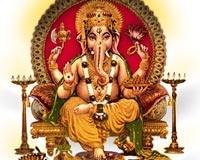 When
Parvati came to know about this, she persuaded Shiva, to restore Ganesha to
life. Shiva ordered his servants (Gana) to bring the head of any creature that
they come across first. An elephant, the wisest of animals, appeared and became
the spontaneous donor in the head transplant of Ganesha. Shiva attached the head
of the elephant to the torso of Ganesha. After looking at the child (Ganesha),
Parvati asked Shiva that who will consider this god with the face of an
elephant. When
Parvati came to know about this, she persuaded Shiva, to restore Ganesha to
life. Shiva ordered his servants (Gana) to bring the head of any creature that
they come across first. An elephant, the wisest of animals, appeared and became
the spontaneous donor in the head transplant of Ganesha. Shiva attached the head
of the elephant to the torso of Ganesha. After looking at the child (Ganesha),
Parvati asked Shiva that who will consider this god with the face of an
elephant.
Understanding Parvati's viewpoint, Shiva blessed the child, Ganesha that he will
be the lord of beginning and people will worship him first, before any other God
in any kind of undertaking. He ordained that the annual worship of Ganesha,
should take place on the fourth day of the bright half of Bhadrapada
(August-September).
Who is elder? Ganesha or Kartikay
This is another interesting story of Lord Ganesha.Once Ganesha and Kartikay got
into an argument as who was the elder of the two. The matter was told to Lord
Shiva for an answer. Lord Shiva asked that whoever would travel around the world
and come out first had the right to be the elder of two. Lord Kartikay flew off
on his vehicle, the peacock, to take the round of the world. But Ganesha went
round his parents and asked for the reward of his success.
Lord Shiva said: "Beloved and wise -Ganesha! You did not go round the world".
Ganesha replied: "No, but I went round my parents. My parents symbolize the
entire world.'' The argument was settled in favour of Ganesha and thereafter
recognized as the elder of the two brothers. Ganesha got a fruit as reward from
his mother Parvati for this.
Ganesha and His Love for Laddoo
Lord Ganesha is very fond of Laddoo (Modaka - a sweet delicacy). Once upon a day
of Ganesha Puja, Ganesha went from house to house and accepted the offerings of
laddoo. He stuffed himself to the capacity and decided to take a ride on his
mouse at night. Along the moonlit road they got to see a large snake and the
troubled rat stumbled, with the consequence Ganpati fell down .He hit the ground
hard and as a result his stomach burst open. All the laddoos came out but
Ganesha again stuffed them into his stomach. He caught the snake and tied it
round his belly.
Moon witnessed the whole event and laughed heartily. Lord Ganesha lost his
temper and furiously looked about for something to throw at his tormentor.
Getting nothing, he pulled out one of his tusks and hurled it at the moon. He
cursed the moon that no one should look at the moon on the day of Ganesha Puja
.If anyone would look at it , he will get a bad name ,criticism or ill
reputation. If anyone gets to see the moon by chance, he would be free from that
bad name or blame, after hearing the story of Lord Krishna's clearing, his
personality in respect of the Syamantaka jewel. Thus, Ganesha was happy to
proclaim this.
Ganesha Mantra
Ganesha Mantras are known as Siddhi Mantra (the one with perfection). Each and
every mantra is full of energy and power of Lord Ganesha. It is believed that
mantras of Ganesha, when chanted with genuine devotion, give positive results.
These mantras ward off all trials and troubles gracing the devotee with every
success. All mantras are disclosed by the Almighty, through the Intelligence,
Vision and Experience of the divinely illuminated and perfected sages and men
of integral God-Experience.
Ganesha is the power of knowledge, success and fulfillment. It is believed
that people get benefit out of these mantras when chanted with utmost devotion
and faith. Success is not far when you have love and respect, faith and
understanding, kindness and willpower in your heart and when you are in touch
with that power which breaks up all restrictions, obstacles, problems
,difficulties and makes available to you the rays of success, prosperity and
abundance. Some such Mantras are given below for the spiritual benefit of the
readers -
Special Ganesha Mantras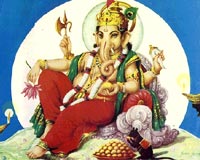
-
Aum Shri Ganeshaya Namah
"Praise to Lord Ganesha". This is the mantra of prayer, love and adoration. It
is chanted to get Ganesha's blessings for the positive starting of a project,
work or simply to offer him the praise.
-
Aum Gan Ganapatye Namah
This is Lord Ganesha's mula ("root") mantra .It is also known as his ''beej''
Mantra. This mantra is used for Yoga Sadhana in which we pray to Lord Ganesha
and merge ourself with the supreme knowledge and peace. This is a mantra from
Ganapati Upanishad. One can always use it before starting any new venture so
that success comes without any hassle.
-
Aum Vakratundaya Hum
This is a powerful mantra from Ganesha Purana. When things are not in your
favour, or when the minds of the people turn negative, depressed or
discouraged, the attention of Ganesha may be drawn by this mantra to
straighten their ways. The HUM symbolizes "Delay no more, my Lord, in
straightening the paths of the crooked-minded ones." This mantra is used many
a times in the Ganesha Purana to reduce the violence of cruel demons. In
addition, this mantra could also be used for healing any spinal problem, such
as curvature of the spine or curved limbs. Dedicate 1,008 repetitions of this
holy word to straighten and heal such deficiencies.
-
Aum Kshipra Prasadaya Namah
Kshipra means immediate. If some danger or negative energy is coming your way
and you don't know how to get rid of that danger, with true devotion, practice
this mantra for quick blessing and purification of one's aura.
-
Aum Shrim Hrim Klim Glaum Gam Ganapataye vara varada sarva janamme
vashamanaya svaha
There are several beej (seed) mantras in this mantra. Among other things, it
says, "Shower Your blessings, O Lord. I offer my ego as an oblation."
-
Aum Sumukhaya Namah
This mantra has a lot of meaning, in simple terms, it means you will be always
very beautiful in soul, in spirit, in face, everything. By meditating on this
mantra, very pleasing manners and a beauty comes on you. Along with that comes
peace, which constantly works in your eyes; and the words you speak are all
filled with that power of love.
-
Aum Ekadantaya Namah
Ekadanta refers to one tusk in the elephant face, which means God broke the
duality and made you to have a complete one-pointed mind. Whoever has that
oneness of mind and single-minded devotion will achieve everything.
-
Aum Kapilaya Namah
Kapila (red) means that you are able to give colour therapy. You are able to
create colours around yourself and around others, soak them in that colour and
heal them. As per the mantra you create, so will you create the colors.
Another meaning is "wish cow," the "cow of plenty." It means that whatever you
wish, that comes true. There is a wish-cow inside you. Whatever you wish,
especially for curing others, comes true instantly.
-
Aum Gajakarnikaya Namah
The ears of Ganesha, the elephant - god, are constant fanning, which means
people can talk a lot, but you are not receiving inside anything other than
what is important. It also means that you can sit anywhere and tune this
celestial tube (the body) with seven channels (chakras) and all 72,000 nadis,
to any loka and be able to hear ancestors, angels, the voice of God or the
voice of prophets. That kind of inner ear you will develop through this
mantra.
-
Aum Lambodaraya Namah
This means you feel that you are this universe. It means that all the
celestial bodies are within you. Like an entire tree is in the seed, the whole
universe is in the sound of creation, which is Aum, and that Aum consciousness
in you makes you feel that you are the universe. Therefore, if you say,
realizing the oneness with the universe, "shanti to the world" every day, then
the grace of God will come and there will be world peace, universal peace. It
is the universe within Aum and Aum within you.
-
Aum Vikataya Namah
This means realizing this world as a dream or a drama. When you are in that
high consciousness, this whole world looks like a dream. All of us have taken
a role. We have to play our role in life as wife or husband or children or
citizens, all consistent with the role we have taken. When an actor bitten by
a sponge cobra that is brought on the stage falls, the entire audience cries;
but that boy who has fallen knows it was not a real cobra and he is not dead.
Life is a drama --definitely life in this material world, this physical world
of ego, is a drama. But inside, like the boy on the stage who is quite happy
knowing that he didn't die by the bite of the sponge cobra, like that, the
truth never dies in us; it is immortal. So everything else you consider as
drama. That consciousness comes to you by knowing this mantra.
-
Aum Vighna Nashanaya Namah
This mantra invokes the Lord Ganesha to remove every hindrance in your life
and in your works. By constant meditation on this mantra, all obstacles and
blocked energy in your physical and cosmological bodies are released.
-
Aum Vinayakaya Namah
Vinayaka is the name of Ganesha in the golden age. So by realizing this
mantra, your life will have a golden age. In your office, in your work, you'll
be the boss. Vinayaka means something under control. Vinayaka means the Lord
of resolving problems.
-
Aum Ganadhyakshaya Namah
This mantra is very important. Suppose you have a group, a country,
neighbours, or any kind of group therapy, group healing or a whole country
requiring healing, then you have to bring that entire group to your mind's
arena and say this mantra. A group healing takes place by this mantra.
-
Aum Bhalachandraya Namah
In Sanskrit, bhala means the forehead center. Chandra means the crescent moon.
Bhalachandra means that chakra from where the nectar drips. That is the secret
of all healing. It is to feel yourself as Shiva, identifying yourself with the
Truth and feeling constantly that you are carrying the crescent moon, the
symbol of growth and nectar of peace.
Shiva
|
Characteristics : |
Destroyer, Kind Hearted |
|
Other Names : |
Shambhu Nath, Bhole Shankar, Shiv Shankar |
|
Principal Scriptures: |
Shiva Mahapurana |
|
Consort : |
Parvati |
|
Sons : |
Ganesha, Kartikay |
|
Abode : |
Mount Kailash |
|
Vahana (Vehicle) : |
Nandi (The Bull Representing Strength and Happiness) |
|
Mula Mantra : |
Om Namah Shivaye |
|
Shiva Gayatri Mantra: |
Aum Panchvakraye Vidmahe
Mahadevaye Dheemahi
Tanno Rudra Prachodayat |
Lord Shiva or Siva is considered as the destroyer of the world. Shiva is one
of the most popular gods of the Hindu religion. Lord Siva forms the part of the
Trimurti (Trinity), the other being Brahma, the creator and Vishnu, the
preserver. Shiva is known for the complexity of his nature, representing
contradictory qualities. He is the destroyer and the restorer, the great ascetic
and the symbol of sensuality, the kind herdsman of souls and a wrathful avenger.
Lord Shiva- The Role
Lord Shiva represents the vital goodness in the form of Satyam, Shivam, Sundaram
i.e.; Truth, Goodness and Beauty .Lord Shiva performs a celestial role of
dissolution and recreation of the universe, that's why; he is mostly associated
with the words, like destroyer and destruction. The role of Shiva is often
confused with these terms and the difficulty arises, when the significance of
his celestial role is not understood.
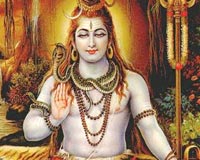 The
conception is clear itself by a slight balance between the opposing forces of
good and evil. When this balance gets disturbed and continuation of life becomes
unfeasible, Lord Shiva dissolves the universe. This is known as '' pralay '' and
it is done in order to create another cycle .So that the unliberated souls will
get another opportunity to liberate themselves from the bondage of the material
world. To put succinctly, Siva protects the souls from pain and suffering that
is generated by the unhealthy universe. The
conception is clear itself by a slight balance between the opposing forces of
good and evil. When this balance gets disturbed and continuation of life becomes
unfeasible, Lord Shiva dissolves the universe. This is known as '' pralay '' and
it is done in order to create another cycle .So that the unliberated souls will
get another opportunity to liberate themselves from the bondage of the material
world. To put succinctly, Siva protects the souls from pain and suffering that
is generated by the unhealthy universe.
Shiva - The Giver
Lord Shiva is known as the ''giver god'', lord of mercy and kindness. He always
protects his devotees from evil forces like lust, greed and anger. He is the
most kind -hearted God who grants boons and bestows grace to his devotees.
Shiva - The Image
Lord Shiva has the unclad body covered with ashes symbolizing the transcendental
aspect of the universe. Siva's three matted locks represent the integration of
the mental, physical and spiritual energies. The crescent moon becomes the part
of lord's ornament symbolizing the time cycle through which creation evolves
from the beginning to the end. The three eyes of Lord Shiva suggest: the Sun is
his right eye, the Moon is the left eye and fire, the third eye.
The Snake around his neck symbolizes the yogic power, which he uses to dissolve
and recreate the universe. The Rudraksha necklace worn by the lord shows that he
uses his celestial powers without compromise,to maintain law and order. The
trishula (trident), symbolizes the Lord's three fundamental powers of will
(iccha), action (kriya) and knowledge (gyana).The damaru (drum) and its two
sides separated from each other symbolizes the two entirely dissimilar states of
existence, invisible and evident.
The bull, Nandi is linked with Shiva and it is considered as his vehicle. The
bull symbolizes both power and ignorance. Tiger's skin makes Lord Shiva's
clothing and his seat, which illustrates the idea that he is the source of
potential energy during the dissolution of the universe. Thus, Lord Shiva is
well-regarded as the ultimate organizer of the birth and death in the corporeal
world.
Shiva - The Lingam
Shiva is worshipped in his invisible and an unborn form, known as the lingam.
Lingam is always accompanied by the Yoni, which is the female part, adjoining
the base of the lingam. The lingam symbolizes the male creative power of Shiva.
Shiva Chalisa
Shiva Chalisa is a "forty verse" prayer. Verses are recited or chanted by
groups. The acts and deeds of Shiva are recalled in these verses to aid the
devotee to meditate on virtuous and noble qualities.
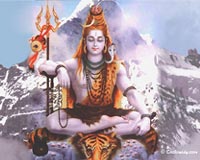
ll Doha ll
Jai Ganesh Girija Suvan, Mangal Mool Sujaan l l
Kahat Ayodhyadas Tum, Dehu Abhaya Vardan l
ll Chaupai ll
Jai Girijapati Deen Dayala, Sada Karat Santan Pratipala
Bhal Chandrama Sohati Neeke, Kanan Kundal Nag Phani Ke
Ang Gaur Shiv Ganga Bahaye, Mundamal Tan Kshar Lagaye
Vastra Khaal Baghambar Sohe, Chhavi Ko Dekh Nag Muni Mohe
Maina Matu Ki Priya Dulari, Bam Ang Sohat Chhavi Pyari
Kar Trishul Sohat Chhavi Bhari, Karat Sada Shatrun Shaykari
Nandi Ganesh Sohe Tanha Kaise, Sagar Madhya Kamal Hain Jaise
Kartik Shyam Aur Gana Raau, Ya Chhavi Ko Kahi Jaat Na Kaau
Devan Jabhee Jaaye Pukara,Tabahin Dukh Prabhu Ap Nivaara
Keen Upadrava Taarak Bhari, Devan Sab Mili Tumhee Pukari
Turat Shadanan Ap Pathayo, Luv Nimesh Mahi Mar Girayo
Ap Jallandhar Asur Sanhara, Suyash Tumhar Vidit Sansara
Tripurasur Sang Yuddha Machayi, Sabahin Kripa Kari Leen Bachayi
Keeya Taphin Bhagirath Bhari, Purahi Pratigya Tasu Purari
Darpa Chhod Ganga Tab Ayee, Sewak Astuti Karat Sadahee
Ved Naam Mahima Tav Gayaee, Akath Anadi Bhed Nahin Payee
Pragati Udadhi Manthan Mein Jwala, Jare Surasur Bhaye Vihaala
Mahadeva Tab Kari Sahayee, Neelkantha Tav Nam Dharayee
Poojan Ramchandra Jab Keenha, Lanka Jeet Vibhishan Deenha
Sahas Kamal me ho rahe dhaari, Keenha Pareeksha Tabahi Purari
Ek Kamal Prabhu Rakheu johee, Kamal Nayan Poojan Chahin Soyee
Kathin Bhakti Dekhi Prabhu Shankar, Bhaye Prasanna Deya Icchhit Var
Jai Jai Jai Ananta Avinasi, Karat Kripa Sab Ke Ghatvasi
Dushta Sakal Mohi Nitya Sataven, Bhramita Rahe Mohe Chain Na Aave
Trahi Trahi Main Nath Pukaro, Yeh Avasar Mohi Ani Ubaro
Lai Trishool Shatrun Ko Maro, Sankat Se Mohi Ani Ubaro
Mata Pita Bhrata Sab Hoi, Sankat Mein Poochat Nahi Koi
Swami Ek Hai Aas Tumhari, Aaye Harahu Mam Sankat Bhaari
Dhan Nirdhan Kon Det Sadaee, Arat Jan Ki Peer Mitaee
Astuti Kehi Vidhi Karahu Tumhari, Shamhu Naath Ab Chook Hamari
Shanker Ho Sankat Ke Nashan, Vighna Vinashan Mangal Kaaran
Yogi Yati Muni Dhyan Lagave, Sharad Narad Sheesh Navave
Namo Namo Jai Namah Shivaye, Sur Brahmadik Par Na Paaye
Jo Yeh Path Kare Man Layee, Tapar Hot Hain Shambu Sahayee
Riniya Jo Koi Ho Adhikaari, Paath Kare So Paavanhaari
Putra Heen Ichha Kar Koi, Nishchaya Shiv Prasad Tehi Hoi
Pandit Triyodashi Ko Lave, Dhyan Poorvak Hom Karave
Triyodashi Vrata Kare Hamesha, Tan Nahi Take Rahe Kalesha
Dhoop Deep Naivedya Chadhavai, Shanker Sanmukha Path Karavahi
Janam Janam Ki Pap Nasave, Anta Vaas Shivpur Men Paave
Hey Shankar Hai Aas Tumhari, Dukh Peera Ab Harahu Hamari
ll Doha ll
Nit Nem Kar Praatha Hee ,Paath Karo Chaalis l
Tum Meri Manokaamna, Puran Karo Jagdeesh ll
Magsar Chhati Hemant Ritu, Sanvat Chausadh Jaan l
Astuti Chaalisa Shivhi, Puran Keen Kalyaan ll
Shiva Legends
Shiva is considered as the destroyer of the universe, in Hinduism. Shiva is a
complex god, in terms of nature and represents contradictory qualities, being
the destroyer and the restorer simultaneously. There are numerous legends
surrounding Lord Shiva and his powers. Here're a few popular stories of Lord
Shiva.
Story of Shiva Lingam - Why Shiva is worshipped in the Phallic Form
This is an interesting story regarding the worship of Lord Shiva in the phallic
form. It is believed that once Brahma and Vishnu, the two deities of the
Trinity, got into an argument regarding their supremacy. Lord Brahma declared
himself to be more admired, being the creator. While the preserver, Vishnu,
pronounced that he commanded more admiration. Just then a huge pillar of fire
(lingam), called as Jyotirlinga, appeared in flames, before them. This Lingam
enthralled both Brahma and Vishnu, with its hastily increasing size.
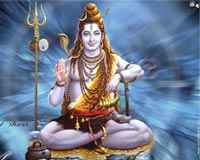 With
this incident, they forgot their quarrel and decided to find its size. Vishnu
took the form of boar and went to the netherworld. Brahma assumed the form of a
Swan and flew to the skies. However both of them were unsuccessful in completing
the self-assumed tasks. At that time, Shiva appeared out of the lingam and
acknowledged that he was the progenitor of both, Brahma and Vishnu. So, he
should be worshipped in his phallic (lingam) form, and not in the
anthropomorphic form. With
this incident, they forgot their quarrel and decided to find its size. Vishnu
took the form of boar and went to the netherworld. Brahma assumed the form of a
Swan and flew to the skies. However both of them were unsuccessful in completing
the self-assumed tasks. At that time, Shiva appeared out of the lingam and
acknowledged that he was the progenitor of both, Brahma and Vishnu. So, he
should be worshipped in his phallic (lingam) form, and not in the
anthropomorphic form.
Story of Shiva and the Hunter
Here is one more interesting story of Lord Shiva, showing his merciful nature.
Once a hunter was wandering in a dense forest, to chase a deer and suddenly he
found himself on the banks of river Kolidum, where he heard the roar of a tiger.
In order to defend himself from the tiger, he climbed up a tree close by. The
Tiger sat on the ground below the tree without the purpose to leave.
The huntsman stayed at the tree whole night and to keep himself awake, he
plucked one leaf after another from the tree and threw it down. There was a
Shiva Lingam under the tree and gracefully the tree turned out to be a ''bilva''
tree (leaves of this tree are adored by Shiva). Without any knowledge, the
huntsman had delighted the deity by pouring Bilva leaves all night. With the
arrival of the sun, the hunter looked down and found the tiger gone. In its
place, Lord Shiva was standing and he prostate before the lord. With Shiva's
blessings, he attained salvation from the bondage of the material world.
Different Names of Shiva
Lord Shiva is considered as the destroyer of the Universe as per the Hindu
Mythology. Shiva is one of the most popular gods of the Hindus. Lord Shiva is
a complex god like goddess Kali, being destroyer and restorer at the same
time. Shiva is also known as Bhole Shankar, the innocent god, who gets
appeased easily. Shiv Shambhu is also recognized as an ascetic, as he resides
on Mount Kailash in meditation. God Shiv is worshipped usually in his phallic
(Lingam) form. Special Worship of Shiva can be seen during the month of Saawan
(July-August) of Hinduism. Lord Shiva is known by many different names. This
list contains 108 names of Lord Shiva with their meanings:
|
Names |
Meanings |
|
Aashutosh |
One Who Fulfills Wishes at once |
|
Aja |
Unborn |
|
Akshayaguna |
God with Numberless Attributes |
|
Anagha |
Without Any error |
|
Anantadrishti |
of Infinite Vision |
|
Augadh |
One Who Revels All the Time |
|
Avyayaprabhu |
Everlasting Lord |
|
Bhairav |
Lord of Terror |
|
Bhalanetra |
One Who Has an Eye in the Forehead |
|
Bholenath |
Kind Hearted Lord |
|
Bhooteshwara |
Lord of Ghosts and Evil Beings |
|
Bhudeva |
Lord of the Earth |
|
Bhutapala |
Protector of the Ghosts |
|
Chandrapal |
Master Of The Moon |
|
Chandraprakash |
One Who Has Moon As A Crest |
|
Dayalu |
Compassionate |
|
Devadeva |
Lord Of The Lords |
|
Dhanadeepa |
Lord Of Affluence |
|
Dhyanadeep |
Icon Of Meditation And Concentration |
|
Dhyutidhara |
Lord Of Radiance |
|
Digambara |
Ascetic Without Any Clothes |
|
Durjaneeya |
Difficult To Be Known |
|
Durjaya |
Unvanquished |
|
Gangadhara |
God Of River Ganga |
|
Girijapati |
Husband Of Girija (Parvati) |
|
Gunagrahin |
Acceptor Of Gunas |
|
Gurudeva |
Master Of All |
|
Hara |
Remover Of Sins |
|
Jagadisha |
Master Of The Universe |
|
Jaradhishamana |
Redeemer From Afflictions |
|
Jatin |
One Who Has Knotted Hair |
|
Kailas |
One Who Bestows Peace |
|
Kailashadhipati |
Lord Of Mount Kailash |
|
Kailashnath |
Master Of Mount Kailash |
|
Kamalakshana |
Lotus-Eyed Lord |
|
Kantha |
Ever-Radiant |
|
Kapalin |
One WhoWears A Necklace Of Skulls |
|
Khatvangin |
One Who Has The Missile (Khatvangin) In His Hand |
|
Kundalin |
One Who Wears Earrings |
|
Lalataksha |
One Who Has An Eye In The Forehead |
|
Lingadhyaksha |
Lord Of The Lingas |
|
Lingaraja |
Lord Of The Lingas |
|
Lokankara |
Maker Of The Three Worlds |
|
Lokapal |
One Who Takes Care Of The World |
|
Mahabuddhi |
Exceptionally Intelligent |
|
Mahadeva |
Greatest God |
|
Mahakala |
Lord Of All Times |
|
Mahamaya |
Of Great Illusions |
|
Mahamrityunjaya |
Great Victor Of Death |
|
Mahanidhi |
Great Storehouse |
|
Mahashaktimaya |
One Who Has Infinite Powers |
|
Mahayogi |
Supreme of All Gods |
|
Mahesha |
The Almighty |
|
Maheshwara |
Lord of the Lords |
|
Nagabhushana |
One Who Has Snakes as Ornaments |
|
Nataraja |
King of the Art of Dancing |
|
Nilakantha |
Blue Necked Lord |
|
Nityasundara |
Ever Beautiful |
|
Nrityapriya |
Lover of Dance |
|
Omkara |
Originator of OM |
|
Palanhaar |
One Who Protects Everyone |
|
Parameshwara |
First among All Gods |
|
Paramjyoti |
Greatest Splendor |
|
Pashupati |
Lord of All Living Beings |
|
Pinakin |
One Who Has a Bow In His Hand |
|
Pranava |
Originator of the Syllable of OM |
|
Priyabhakta |
Favorite of the Devotees |
|
Priyadarshana |
of Loving Vision |
|
Pushkara |
One Who Gives Nourishment |
|
Pushpalochana |
One Who Has Eyes like Flowers |
|
Ravilochana |
Having Sun as the Eye |
|
Rudra |
the Dreadful |
|
Rudraksha |
One Who Has Eyes like Rudra |
|
Sadashiva |
Eternal God |
|
Sanatana |
Eternal Lord |
|
Sarvacharya |
Preceptor of All |
|
Sarvashiva |
Always Chaste |
|
Sarvatapana |
Scorcher of All |
|
Sarvayoni |
Source of Everything |
|
Sarveshwara |
Lord of All Gods |
|
Shambhu |
One Who Bestows Prosperity |
|
Shankara |
One Who Gives Happiness |
|
Shiva |
Always Pure |
|
Shoolin |
One Who Has a Trident (Trishool) |
|
Shrikantha |
of Magnificent Neck |
|
Shrutiprakasha |
Illuminator of the Vedas |
|
Shuddhavigraha |
One Who Has a Pure Body |
|
Skandaguru |
Preceptor of Skanda |
|
Someshwara |
Lord of All Gods |
|
Sukhada |
Bestower of Happiness |
|
Suprita |
Well Pleased |
|
Suragana |
Having Gods As Attendants |
|
Sureshwara |
Lord Of All Gods |
|
Swayambhu |
Self-Manifested |
|
Tejaswani |
One Who Spreads Illumination |
|
Trilochana |
Three-Eyed Lord |
|
Trilokpati |
Master of All the Three Worlds |
|
Tripurari |
Enemy of Tripura |
|
Trishoolin |
One Who Has a Trident in His Hands |
|
Umapati |
Husband of Uma (Parvati) |
|
Vachaspati |
Lord of Speech |
|
Vajrahasta |
One Who Has a Thunderbolt in His Hands |
|
Varada |
Granter of Boons |
|
Vedakarta |
Creator of the Vedas |
|
Veerabhadra |
Supreme Lord of the Nether World |
|
Vishalaksha |
Wide-Eyed Lord s |
|
Vishveshwara |
Lord of the Universe |
|
Vrishavahana |
One Who Has Bull as His Mount |
Hanuman
|
Characteristics : |
Strength, Divinity and Quick Wits |
|
Other Names : |
Pawanputra, Marutinandan, Bajrangbali, Anjaniputra |
|
Principal Scriptures: |
Ramayana, Shiva Mahapurana |
|
Mula Mantra : |
Om Shri Hanumate Namah |
|
Hanuman Gayatri Mantra: |
Aum Anjaneyaye Vidmahe
Mahabalaye Dheemahi
Tanno Hanumat Prachodayat |
Hanuman is considered to be an avatar (incarnation) of Lord Shiva. Shri
Hanuman, a great disciple of Sri Rama, is the symbol of devotion and dedication.
Lord Hanumana is a provider of courage, hope, knowledge, intellect and devotion.
Hanuman is in the form of Vaanar (monkey). He is usually pictured as a strong
monkey holding a gada (mace) which is a sign of bravery and having a picture of
Lord Rama on his chest which is a sign of his devotion to Lord Rama.
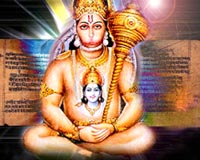 Birth
of Hanuman Birth
of Hanuman
Hanuman was born in the Treta Yuga, to Anjana, a female vanara and Kesari, a
strong vanara .This birth was planned by the Supreme lord with a perfect idea in
the mind. The combination of Vanara and the celestial gave Hanuman strength,
divinity and quick wits - his main characteristics. Being Anjana's son, Hanuman
is also called Anjaneya, which plainly means "arising from Anjana".
Hanuman- The Brahmachaari
Hanuman remained a Brahmachaari throughout his life, an unmarried, celibate god.
He is especially popular with body-builders, who believe that like him, one need
to be celibate in order to have a strong body. Hanuman always treated women in
the form of Mother and Sister. There are many incidences in the great epic
Ramayana where this fact is proved.
Lord Hanuman - A Great Disciple
Hanuman has intense love for his Lord Rama which can be considered from this
instance. Once Hanuman was asked by Sri Rama, "How do you consider me?". Hanuman
said: "Oh Lord, while I identify myself with my body, I am Thy servant. When I
consider myself an individual soul, I am Thy part. But when I look upon myself
as the spirit, I am one with Thee. This is my firm conviction."
Worship of Hanuman
Hanuman is worshipped for his strength, agility and valor. The worship of
Hanuman, symbolizes the worship of the Supreme Lord, for acquiring knowledge,
physical and mental strength, truthfulness, sincerity, self-sacrifice, modesty,
loyalty, and profound devotion to the Lord. Sri Hanuman was blessed by Sri Rama
with immortality (chiranjeevi). Every temple of Sri Rama contains an idol of
Hanuman. Worship of Hanuman is considered mandatory to complete the worship of
Lord Rama.
During Chaitra (in between March-April), Hanuman Jayanti is celebrated to honor
the birth of Hanuman, the monkey god widely acclaimed throughout India.
Hanuman Aarti
Hanuman Aarti completes the worship or prayers made to the God. It is believed
that aarti provides a completion to the puja .This aarti of Shri Hanuman is
also known Bajrangbali Aarti.
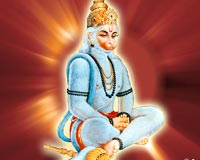
Aarati Keejai Hanuman Lalaa Kee,
Dushta Dalan Raghunath Kalaa Kee,
Jaakay Bal Say Girivar Kaapay,
Roga Dosha Jaakay Nikat Na Jhaakay,
Anjani Putra Mahaa Baldayee,
Santan Kay Prabhu Sadaa Sahaayee
Day Veeraa Raghunath Pathaayay
Lankaa Jaaree Seeya Sudhi Laaye
Lankaa So Kota Samudra See Khaayee,
Jaata Pavansut Baar Na Laayee,
Lankaa Jaari Asur Sab Maaray,
Seeyaa Raamjee Kay Kaaj Savaaray,
Lakshman Moorcheet Paray Dharanee May,
Aani Sajeevan Praan Ubaaray,
Paithi Pataal Towri Yam Kaaray,
Ahiraavan Ke Bhujaa Ukhaaray,
Baaya Bhuja Asur Sanhaaray,
Dahinay Bhujaa Sab Sant Ubaaray,
Sur Nar Muni Jan Aarati Utaaray,
Jai Jai Jai Hanuman Jee Uchaaray,
Kanchan Thaar Kapoor Kee Baatee,
Aarati Karat Anjani Maayee,
Jo Hanuman Jee Kee Aarati Gaavai,
So Baikuntha Amara Pad Paavai,
Lanka Vidvans Kiye Raghuraayee,
Tulsee Daas Swami Keerati Gaayee.
Shri Hanuman Chalisa
Shri Hanuman Chalisa is a prayer of "forty verses". Verses are recited or
chanted by groups. The acts and deeds of Lord Hanuman are recalled in these
verses to aid the devotee to meditate on virtuous and noble qualities.
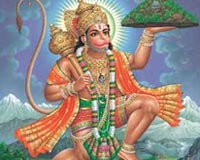
ll Doha ll
Shri Guru Charana Saroj Raja, Nija Mana Mukura Sudhaar l
Baranou Raghubara Bimala Jasu, Jo Daayaku Phala Chaar ll
Buddhi Heena Tanujaanike ,Sumeero Pawana Kumaar l
Bala Buddhi Vidhya Dehu Mohi, Harahu Kalesha Vikaar ll
ll Chaupai ll
Jai Hanuman Gyana Gunasagara, Jai Kapeesa Tihu Loka Ujaagara
Rama Doota Atulita Baladhaamaa, Anjanee Putra Pawanasuta Naama
Mahabir Bikram Bajarangee, Kumatee Nivaara Sumatee Ke Sangee
Kanchana Barana Biraaja Subesha ,Kanana Kundala Kunchita Kesha
Haatha Vajra Aur Dhwajaa Birajay, Kaandhe Moonj Janeun Saaje
Shankara Suvana Kesaree Nandana,Teja Pratapa Maha Jaga Vandana
Vidya Vaana Gunee Aati Chatur, Ramakaja Kareebe Ko Aatur
Prabhu Charitra Suneebe Ko Rasiya,Rama Lakhana Seeta Mana Basiya
Suukshmaroopadhari Siyahi Dikhava,Vikataroopadhari Lanka Jarawaa
Bhima Roopa Dharee Asura Sanhaare, Ramachandra Ke Kaaja Sanwaare
Laaye Sanjeevan Lakhana Jiyaye, Shri Raghubeera Harasheeura Laaye
Raghupatee Keenhi Bahuta Badaayii,Tum Mam Priya Bharata Sama Bhayee
Sahas Badan Tumharo Jas Gave, Asa Kahe Shreepathee Kantha Lagaave
Sanaka Dik Brahma Dee Muneesa, Narada Sharada Sahita Aheesa
Yama Kubera Digapaala Jahan The, Kavi Kovida Kahee Sakay Kahan The
Tum Upakaara Sugreevaheen Keenha, Rama Milaaya Rajapada Deenha
Tumharo Mantra Vibheeshana Maanaa,Lankeshwara Bhaye Saba Jaga Jaanaa
Juga Sahastra Yojana Par Bhanu ,Leelyo Taahi Madhura Phala Jaanu
Prabhu Mudrika Meli Mukha Mayee, Jaladhi Laanghee Gaye Acharaj Nahee
Durgama Kaaja Jagatke Jethe, Sugama Anugraha Tumhare Tete
Rama Duaare Tuma Rakhawaale, Hota Na Aagyan Bina Paysaare
Sab Sukh Lahai Tumhari Sarana, Tum Rakshak Kahoo Ko Darna
Aapan Tej Samhaarao Aape, Teeno Lok Haankate Kaapein
Bhoota Pishaacha Nikata Nahee Aawe, Mahabeera Jaba Naama Sunaavay
Naashai Roga Hare Sab Peera, Japata Nirantara Hanumatha Beera
Sankat Se Hanuman Chodave, Man Krama Bachana Dhyan Jo Laave
Sab Para Raama Tapasvi Raja, Tinake Kaaja Sakal Tum Saaja
Aur Manoratha Jo Koyee Laave, Soyee Amitha Jeevan Phala Paave
Charahu Yuga Parataapa Tumhara, Hai Parasiddha Jagata Ujiyaaraa
Sadhoo Sant Ke Tuma Rakhwaale, Asura Nikandana Raama Dulare
Ashta Siddhi Nava Nidhi Ke Daataa, Asabara Deena Jaankee Maataa
Rama Rasayan Tumhare Paasaa, Sadha Raho Raghupathee Ke Daasaa
Tumhare Bhajan Ram Ko Paave, Janma Janma Ke Dukha Bisaraave
Antha Kaal Raghupatee Pura Jaayee,Jahaa Janma Hari Bhakta Kahayee
Aur Devatha Chit Na Dharayee, Hanumatha Seyi Sarva Sukha Karayee
Sankata Kate Mite Sab Peera , Jo Sumeere Hanumatha Bala Beera
Jai Jai Jai Hanuman Gosai, Kripa Karahu Gurudeva Kee Naayee
Yah Shata Baar Paatha Kara Joyee, Chutahee Bandhee Maha Sukha Hoyi
Jo Yaha Pade Hanuman Chaleesa, Hoye Siddhi Saakhee Goureesa
Tulasidasa Sada Hari Chera, Keejay Naatha Hridaya Maha Dera
ll Doha ll
Pawana Tanaya Sankat Harana, Mangala Muuratee Rupa l
Rama Lakhana Seeta Sahita, Hridaya Basahu Sura Bhoop ll
Different Names of Hanuman
Lord Hanuman is the epitome of devotion and dedication towards his Lord Rama.
Shri Hanuman is considered as the avatar or incarnation of Lord Shiva. Hanuman
is also known as the Monkey God, who represents strength, valor, wisdom,
intellect and sincere devotion. Hanuman is a powerful God who observed
celibacy throughout his life. Lord Hanuman is often worshipped to attain
mental peace, knowledge, strength and power. Hanuman is known by different
names like Pavanputra, Anjaneya, Bajrangbali, Jai Veer Hanuman and many more
names. The following list contains 108 names of Hanuman with their meanings:
|
Name |
Meaning |
|
Anjaneya |
Son of Anjana |
|
Anjanagarbhasambhoota |
Born of Anjani |
|
Ashokavanikachhetre |
Destroyer of Ashoka Orchard |
|
Akshahantre |
Slayer of Aksha |
|
Balarka |
Sadrushanana Like the Rising Sun |
|
Bheemasenasahayakrute |
Helper of Bheema |
|
Batnasiddhikara |
Granter of Strength |
|
Bhakthavatsala |
Protector of Devotees |
|
Bajrangbali |
With strength of daamod |
|
Bhavishya |
Chaturanana Aware of Future Happenings |
|
Chanchaladwala |
Glittering Tail Suspended Above The Head. |
|
Chiranjeevini |
Immortal |
|
Chaturbahave |
Four-Armed |
|
Dashabahave |
Ten-Armed |
|
Danta |
Peaceful |
|
Dheera |
Courageous |
|
Deenabandhave |
Defender of the Oppressed |
|
Daithyakulantaka |
Destroyer of Demons |
|
Daityakarya |
Vidhyataka Destroyer of All Demons' Activities |
|
Dhruddavrata |
Determined Meditator |
|
Dashagreevakulantaka |
Slayer of the Ten-Headed Ravana Race |
|
Gandharvavidya |
Tatvangna Exponent in the Art of Celestials |
|
Gandhamadhana |
Shailastha Resident of Gandhamadhana |
|
Hanumanta |
One with Puffy Cheeks |
|
Indrajit |
Prahitamoghabrahmastra Vinivaraka Remover of the Effect of Indrajit's
Brahmastra |
|
Jambavatpreeti |
Vardhana Winner of Jambavan's Love |
|
JaiKapeesh |
Hailing Monkey |
|
Kapeeshwara |
Lord of Monkeys |
|
Kabalikruta |
One who swallowed the Sun |
|
Kapisenanayaka |
Head of the Monkey Army |
|
Kumarabrahmacharine |
Youthful Bachelor |
|
Kesarinandan |
Son of Kesari |
|
Kesarisuta |
Son of Kesari |
|
Kalanemi |
Pramathana Slayer of Kalanemi |
|
Harimarkatamarkata |
Lord of the Monkeys |
|
Karagrahavimoktre |
One who Frees from Imprisonment |
|
Kalanabha |
Organizer of Time |
|
Kanchanabha |
Golden-Hued Body |
|
Kamaroopine |
Altering Form at Will |
|
Lankineebhanjana |
Slayer of Lankini |
|
Lakshmanapranadatre |
Reviver of Lakshmana's Life |
|
Lankapuravidahaka |
The One Who Burnt Lanka |
|
Lokapujya |
Worshipped by the Universe |
|
Maruti |
Son of Marut (wind god) |
|
Mahadhyuta |
Most Radiant |
|
Mahakaya |
One with colossal body |
|
Manojavaya |
Swiftness like Wind |
|
Mahatmane |
Supreme Being |
|
Mahavira |
Most Courageous |
|
Marutatmaja |
Adored Like Gems |
|
Mahabala |
Parakrama Of Great Strength |
|
Mahatejase |
Most Radiant |
|
Maharavanamardana |
Slayer of the Famous Ravana |
|
Mahatapase |
Great Meditator |
|
Navavyakruti |
Pandita Skilful Scholar |
|
Parthadhwajagrasamvasine |
Having Principal Place on Arjuna's Flag |
|
Pragnya |
Scholar |
|
Prasannatmane |
Cheerful |
|
Pratapavate |
Known for Valour |
|
Paravidhyaparihara |
Destroyer of Enemies Wisdom |
|
Parashaurya |
Vinashana Destroyer of Enemy's Valour |
|
Parijata |
Tarumoolastha Dweller under the Parijata Tree |
|
Prabhave |
Popular Lord |
|
Paramantra |
Nirakartre Acceptor of Rama's Mantra Only |
|
Pingalaksha |
Pink-Eyed |
|
Pavanputra |
Son of Wind god |
|
Panchavaktra |
Five-Faced |
|
Parayantra |
Prabhedaka Destroyer of Enemies' Missions |
|
Ramasugreeva |
Sandhatre Mediator between Rama and Sugreeva |
|
Ramakathalolaya |
Crazy of listening Rama's Story |
|
Ratnakundala |
Deeptimate Wearing Gem-Studded Earrings |
|
Rudraveerya |
Samudbhava Born of Shiva |
|
Ramachudamaniprada |
Deliverer of Rama's Ring |
|
Ramabhakta |
Devoted to Rama |
|
Ramadhuta |
Ambassador of Rama |
|
Rakshovidhwansakaraka |
Slayer of Demons |
|
Sankatamochanan |
Reliever of sorrows |
|
Sitadevi |
Mudrapradayaka Deliverer of the Ring of Sita |
|
Sarvamayavibhanjana |
Destroyer of All Illusions |
|
Sarvabandha |
Vimoktre Detacher of all Relationship |
|
Sarvagraha |
Nivashinay Killer of all Evil Effects of Planets |
|
Sarvaduhkhahara |
Reliever of all Agonies |
|
Sarvalolkacharine |
Wanderer of all Places |
|
Sarvamantra |
Swaroopavate Possessor of all Hymns |
|
Sarvatantra |
Sawaroopine Shape of all Hymns |
|
Sarvayantratmaka |
Dweller in all Yantras |
|
Sarvarogahara |
Reliever of all Ailments |
|
Sarvavidhyasampath |
Pradayaka Granter of Knowledge and Wisdom |
|
Shrunkalabandhamochaka |
Reliever from a Chain of Distresses |
|
Sitashoka |
Nivarana Destroyer of Sita's Sorrow |
|
Shrimate |
Honored |
|
Simhikaprana |
Bhanjana Slayer of Simhika |
|
Sugreeva |
Sachiva Minister of Sugreeva |
|
Shoora |
Gallant |
|
Surarchita |
Worshipped by Celestials |
|
Sphatikabha |
Spotless, Crystal-Clear |
|
Sanjeevananagahatre |
Carrier of Sanjeevi Mount |
|
Shuchaye |
Pure, Chaste |
|
Shanta |
Very Composed and Calm |
|
Shatakanttamadapahate |
Destroyer of Shatakantta's Arrogance |
|
Sitanveshana |
Pandita Skilful in finding Sita's Whereabouts |
|
Sharapanjarabhedaka |
Destroyer of the Nest made of Arrows |
|
Sitaramapadaseva |
Always engaged in Rama's Service |
|
Sagarotharaka |
Leapt Across the Ocean |
|
Tatvagyanaprada |
Granter of Wisdom |
|
Vanara |
Monkey |
|
Vibheeshanapriyakara |
Beloved of Vibheeshana |
|
Vajrakaya |
Hard Like Metal |
|
Vardhimainakapujita |
Worshipped by Mynaka |
|
Vagmine |
Spokesman |
|
Vijitendriya |
Controller of the Senses |
|
Vajranakha |
Strong-Nailed |
|
Vagadheeksha |
Lord of Spokesmen |
|
Yogine |
Yogi (Saint) |
Legends of Hanuman
Hanuman ji is considered as the incarnation of Lord Shiva.
Shri Hanuman is one of the popular gods of the Hindu religion and is worshipped
all over the world. Life of Hanuman is a legend in itself, for his immeasurable
love towards his Prabhu Ram. Here, are some stories of Sri Hanuman's life that
shows his supreme devotion for Lord Rama.
Hanuman - A Great Disciple of Rama
Hanuman is a supreme devotee of Sri Rama. Many incidents of Hanuman's life
acclaim this love. This is one interesting story which confirms the deep love of
Hanuman for Lord Rama. Once when Sita ji (Consort of Lord Rama) was applying
sindoora (vermillion) to her hair, Hanuman asked her the reason for doing so.
She replied that by applying sindoora, she ensured a long life for her husband.
The more sindoora she applied, the longer Rama's life would be. The devoted
Hanuman then smeared his entire body with sindoora, in an effort to ensure
Rama's immortality.
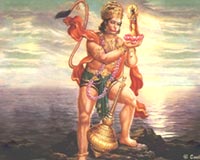 Hanuman
and His Love for Eating Hanuman
and His Love for Eating
Here is one more interesting story of Hanuman depicting the regard and
dedication towards the Lord Rama. Once Sita ji invited Hanuman for a lunch and
especially which was cooked by her. Sita ji made many delicacies for the lunch,
which was to be attended by Hanuman. Hanuman ji came and started eating the food
served to him. He ate the whole food which was made in the kitchen .Sita ji
quickly made more delicacies in order to satisfy the hunger of Hanuman. Hanuman
ate that too and asked for more. Again, Sita ji cooked some more food and again
it got finished in seconds.
The condition was that nothing was left in the kitchen to cook. Sita ji got
tensed and thought to ask lord Rama about the situation. She conveyed the whole
scene to Rama. Rama asked Sita ji to give a Tulsi-dal (a leaf of Tulsi) to
Hanuman and her problem would be solved. Sita ji did the same and Hanuman's
appetite got satisfied. This shows that the words of Lord Rama are inevitable
for Hanuman.
Krishna
|
Characteristics : |
Strength, Beauty, Knowledge, Opulence |
|
Other Names : |
Kanhaiya, Gopal, Keshava, Kanha |
|
Principal Scriptures : |
Mahabharata, Bhagawad Gita, Vishnu Purana, Bhagavata Purana |
|
Mula Mantra : |
Om Kleem Krishnaya Namah |
|
Krishna Gayatri Mantra: |
Om Daamodharayae Vidmahee
Rukmani Vallabhaye Dheemahee
Tanno Krishna Prachodayaath |
|
Consort : |
Rukmini ji |
Lord Krishna is one of the most popular and worshipped deities
of the Hindu religion. Krishna is considered as the eighth avatar of Lord
Vishnu, the divine. Shri Krishna is the very embodiment of love and divine
ecstasy that destroys all pain and offense. Lord Krishna took birth over five
thousand years ago in Mathura, India to Devaki (Sister of Cruel Demon-King
Kansa) and Vasudeva in the prison cell of the tyrant Kansa. The sage Narada had
predicted that Kansa would be killed by his nephew, so the king killed Devaki's
first six children. The Seventh, Balarama escaped and the eighth, Krishna was
clandestinely exchanged for a cowherd's daughter.
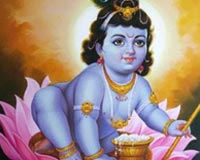 A
Great Lover - Krishna A
Great Lover - Krishna
Krishna was greatly attached to his foster mother, Yashoda. The lord had immense
love for cows being nurtured in the cowherd's family. In his childhood, he was
really fond of Makhan (butter) and there are many famous mischiefs regarding
this love. Later Krishna loved to play flute and used to seduce the village
girls. His favourite was Radha who is claimed as the love of Krishna. And this
is one of the famous love stories of Hindu mythology. The Lord is usually
remembered and worshipped as Radha-Krishna. The pair symbolizes the eternal love
between people and god. Krishna is recognized as the god of Hasya or humor and a
messenger of peace.
Virtues
Sri Krishna is the naturally loving and sweet aspect of Vishnu, Lord of Srimati
Radharani and center of the spiritual abode. Krishna is the defender of sacred
utterances. Krishna is a trickster and lover, a mastermind of all forms of
knowledge and born to set up the religion of love. He is also known for his
bravery in destroying evil powers throughout his life.
Phrase from Bhagavad Gita
It is believed that the Supreme Lord comes down from time to time in this
material world to reestablish the teachings of the Vedas. Lord Krishna promises
in his Bhagawad Gita: "Whenever and wherever there is a decline in religious
practice, O descendant of Bharata, and a predominant rise of irreligion--at that
time I descend myself. To deliver the pious and to annihilate the miscreants, as
well as to reestablish the principles of religion, I myself appear millennium
after millennium."
Krishna Aarti
Shri Krishna Aarti completes the worship or prayers made to the God. It is
believed that aarti provides a completion to the puja .This arti of lord
Krishna is also known as Janmashtami Aarti, which is usually sung on the
birthday of Krishna.
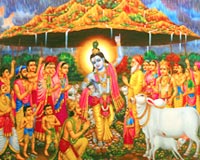
Aaratii Yugala Kishora Kii Kiijai |
Tana Mana Dhana Sab Arpana Kiijai ||
Ravi Shashi Koti Vadana Kii Shobhaa |
Taahi Nirakha Meraa Mana Lobhaa ||
Gaura Shyaama Mukha Nikhrata Riijhai l
Prabhu Ko Ruupa Nayana Bhara Pijai ||
Kanchanna Thaala Kapuura Kii Baatii |
Hari Aaye Nirmala Bahii Chaatii ||.
Phuulana Kii Seja Phuulana Kii Maalaa |
Ratna Sinhaasana Baithe Nandalaalaa ||
Mora Mukuta Kara Muralii Sohai |
Natavara Vesha Dekha Mana Mohai ||
Anga Niila Piita Pata Saarii |
Kunja Bihaarii Giravaradhaarii ||
Shri Purushottama Girivara Dhaarii |
Aaratii Karata Sakala Nar Naarii ||
Nanda Nandana Vrushahaanu Kishorii |
Paramaananda Svaamii Avichala Jodii ||
Krishna Chalisa
Krishna Chalisa means a prayer of "forty verse", which praise and entreat Sri
Krishna with devotion. They are recited over and over again to recall the
virtues of Krishna, the Lord, in order to aid the disciple to meditate on good
and righteous qualities.
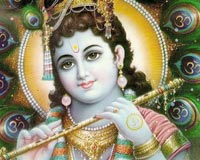
ll Doha ll
Banshi Shobhit Kar Madhur,Neel Jalad Tanu Shyam l
Arun Adhar Janu Bimba Phal,Nayan Kamal Abhiraam ll
Puran Indu Arvind Mukha, Pitaambar Shubha Saaj l
Jai Manmohan Madan Chhavi,Krishnachandra Maharaj ll
ll Chaupai ll
Jai Yadunandan Jai Jagvandan, Jai Vasudev Devki Nandan
Jai Yashoda Sut Nanda Dulaare,Jai Prabhu Bhaktan Ke Rakhavaare
Jai Natanaagar Naag Nathaiyaa, Krishna Kanhaiya Dhenu Charaiya
Puni Nakh Par Prabhu Girivar Dhaaro,Aao Deenan Kasht Nivaaro
Bansi Madhur Adhar Dhari Teri, Hove Puran Manorath Meri
Aao Hari Puni Maakhan Chaakho, Aaj Laaj Bhaktan Ki Raakho
Gol Kapol Chibuk Arunaare,Mridul Muskaan Mohini Daare
Ranjit Raajiv Nayan Vishaalaa, Mor Mukut Vaijayanti Maalaa
Kundal Shravan Peetpat Aache, Kati Kinkini Kaachhan Kaachhe
Neel Jalaj Sundar Tanu Sohe,Chhavi Lakhi Sur Nar Muni Mana Mohe
Mastak Tilak Alak Ghunghraale, Aao Shyaam Bansuri Vaale
Kari Pai Paan, Putanaahin Taaryo, Akaa Bakaa Kaaga Sur Maaryo
Madhuvan Jalat Agni Jab Jvaala, Bhaye Sheetal ,Lakhitahin Nandalala
Surpati Jab Brij Chadhyo Risaai, Musar Dhaar Baari Barsaai
Lagat-Lagat Brij Chahan Bahaayo, Govardhan Nakhdhari Bachaayo.
Lakhi Yashodaa Man Bhram Adhikaai,Mukh Mahan Chaudah Bhuvan Dikhaai
Dusht Kansa Ati Udham Machaayo, Koti Kamal Kahan Phul Mangaayo.
Naathi Kaaliyahin Tab Tum Linhen, Charanchinh Dai Nirbhay Kinhe
Kari Gopin Sang Raas Vilaasa, Sab Ki Puran Kari Abhilashaa
Ketik Mahaa Asur Sanhaaryo, Kansahi Kesh Pakadi Dai Maaryo
Maatu Pitaa Ki Bandi Chhudaayi, Ugrasen Kahan Raaj Dilaayi
Mahi Se Mritak Chhaho Sut Laayo, Matu Devaki Shok Mitaayo
Bhomaasur Mura Daitya Sanhaari, Laaye Shatdash Sahas Kumaari
Dai Bhinhin Trincheer Sanhaara, Jaraasindhu Raakshas Kahan Maara
Asur Vrikaasur Aadik Maaryo, Bhaktan Ke Tab Kasht Nivaariyo
Deen Sudaamaa Ke Dukh Taaryo, Tandul Teen Muthi Mukh Daaryo
Prem Ke Saag Vidura Ghar Maange, Duryodhan Ke Mevaa Tyaage
Laakhi Premki Mahimaa Bhaari, Naumi Shyam Deenan Hitkaari
Maarath Ke Paarath Rath Haanke, Liye Chakra Kar Nahin Bal Thaake
Nij Gitaa Ke Gyaan Sunaaye, Bhaktan Hriday Sudhaa Barsaaye
Meera Thi Aisi Matvaali, Vish Pee Gayi Bajaakar Taali
Raanaa Bhejaa Saamp Pitaari, Shaaligraam Bane Banvaari
Nij Maayaa Tum Vidhihin Dikhaayo, Urate Sanshay Sakal Mitaayo
Tav Shat Nindaa Kari Tatkaalaa, Jivan Mukt Bhayo Shishupaalaa
Jabahin Draupadi Ter Lagaai, Deenanaath Laaj Ab Jaai
Asa Anaatha Ke Naath Kanhaiyaa, Dubat Bhanvar Bachaavat Naiyaa
Sundardaas Aas Ura Dhaari, Dayadrishti Keeje Banwaari
Naath Sakal Mam Kumati Nivaaro, Chhamobegi Apraadh Hamaaro
Kholo Pat Ab Darshan Deeje, Bolo Krishna Kanhaiya Ki Jai
ll Doha ll
Yah Chalisa Krishna Ka, Path Kare Ur Dhaari l l
Asht Siddhi Nav Niddhi Phal, Lahe Padaarath Chaari l
Different Names of Lord Krishna
Sri Krishna is one of the most lovable deities of the Hindu Religion. Lord
Krishna is regarded as the eighth incarnation or avatar of Lord Vishnu.
Krishna took birth in the Dwaparyuga, according to the Hindu Mythology. God
Krishna is the personification of love and ecstasy that vanishes all pain and
sin. Sri Krishna is often depicted as a cowherd's boy, who loves curd and
butter. Lord Krishna is also associated with the Raas-Leela, in which he is
always surrounded by the Gopis (Young cowherd girls). Krishna's immense love
for Radha is immortal and the couple is usually remembered as Radha-Krishna.
Sri Krishna is known by many different names. This list contains 108 names of
Lord Krishna with their meanings:
|
Names |
Meanings |
|
Achala |
Still Lord |
|
Achyuta |
Infallible Lord |
|
Adbhutah |
Wonderful God |
|
Adidev |
The Lord of the Lords |
|
Aditya |
the Son of Aditi |
|
Ajanma |
One Who Is Limitless and Endless |
|
Ajaya |
the Conqueror of Life and Death |
|
Akshara |
Indestructible Lord |
|
Amrut |
One Who Is Sweet as Nectar |
|
Anaadih |
One Who Is the First Cause |
|
Anandsagar |
Compassionate Lord |
|
Ananta |
the Endless Lord |
|
Anantajit |
Ever Victorious Lord |
|
Anaya |
One Who Has No Leader |
|
Aniruddha |
One Who Cannot Be Obstructed |
|
Aparajeet |
the Lord Who Cannot Be Defeated |
|
Avyukta |
One Who Is As Clear As Crystal |
|
Balgopal |
the Child Krishna, the All Attractive |
|
Bali |
the Lord of Strength |
|
Chaturbhuj |
Four-Armed Lord |
|
Danavendra |
Granter of Boons |
|
Dayalu |
Repository of Compassion |
|
Dayanidhi |
the Compassionate Lord |
|
Devadidev |
the God of the Gods |
|
Devakinandan |
Son of Mother Devaki |
|
Devesh |
Lord of the Lords |
|
Dharmadhyaksha |
the Lord OF Dharma |
|
Dwarkapati |
Lord of Dwarka |
|
Gopal |
One Who Plays With the Cowherds, the Gopas |
|
Gopalpriya |
Lover of Cowherds |
|
Govinda |
One who pleases the Cows and the Nature. |
|
Gyaneshwar |
the Lord of Knowledge |
|
Hari |
the Lord of Nature |
|
Hiranyagarbha |
the All Powerful Creator |
|
Hrishikesh |
the Lord of All Senses |
|
Jagadguru |
Preceptor of the Universe |
|
Jagadisha |
Protector of All |
|
Jagannath |
Lord of the Universe |
|
Janardhana |
One Who Bestows Boons on One And All |
|
Jayantah |
Conqueror of All Enemies |
|
Jyotiraaditya |
the Resplendence of the Sun |
|
Kamalnath |
the Lord of Goddess Lakshmi |
|
Kamalnayan |
the Lord with Lotus Shaped Eyes |
|
Kamsantak |
Slayer of Kamsa |
|
Kanjalochana |
the Lotus-Eyed God |
|
Keshava |
One Who Has Long, Black Matted Locks |
|
Krishna |
Dark-Complexioned Lord |
|
Lakshmikantam |
the Lord of Goddess Lakshmi |
|
Lokadhyaksha |
Lord of All the Three Lokas (Worlds) |
|
Madan |
the Lord of Love |
|
Madhava |
Knowledge Filled God |
|
Madhusudan |
Slayer of Demon Madhu |
|
Mahendra |
Lord of Indra |
|
Manmohan |
All Pleasing Lord |
|
Manohar |
Beautiful Lord |
|
Mayur |
the Lord Who Has A Peacock Feathered-Crest |
|
Mohan |
All Attractive God |
|
Murali |
the Flute Playing Lord |
|
Murlidhar |
One Who Holds the Flute |
|
Murlimanohar |
the Flute Playing God |
|
Nandgopala |
the Son of Nand |
|
Narayana |
the Refuge of Everyone |
|
Niranjana |
the Unblemished Lord |
|
Nirguna |
without Any Properties |
|
Padmahasta |
One Who Has Hands like Lotus |
|
Padmanabha |
the Lord Who Has a Lotus Shaped Navel |
|
Parabrahmana |
the Supreme Absolute Truth |
|
Paramatma |
Lord of All Beings |
|
Parampurush |
Supreme Personality |
|
Parthasarthi |
Charioteer of Partha - Arjuna |
|
Prajapati |
Lord of All Creatures |
|
Punyah |
Supremely Pure |
|
Purshottam |
the Supreme Soul |
|
Ravilochana |
One who's Eye Is the Sun |
|
Sahasraakash |
Thousand-Eyed Lord |
|
Sahasrajit |
One Who Vanquishes Thousands |
|
Sahasrapaat |
Thousand-Footed Lord |
|
Sakshi |
All Witnessing Lord |
|
Sanatana |
the Eternal Lord |
|
Sarvajana |
Omniscient Lord |
|
Sarvapalaka |
Protector of All |
|
Sarveshwar |
Lord of All Gods |
|
Satyavachana |
One Who Speaks Only the Truth |
|
Satyavrata |
the Truth Dedicated Lord |
|
Shantah |
Peaceful Lord |
|
Shreshta |
the Most Glorious Lord |
|
Shrikanta |
Beautiful Lord |
|
Shyam |
Dark-Complexioned Lord |
|
Shyamsundara |
Lord of the Beautiful Evenings |
|
Sudarshana |
Handsome Lord |
|
Sumedha |
Intelligent Lord |
|
Suresham |
Lord of All Demi-Gods |
|
Swargapati |
Lord of Heavens |
|
Trivikrama |
Conqueror of All the Three Worlds |
|
Upendra |
Brother of Indra |
|
Vaikunthanatha |
Lord of Vaikuntha, the Heavenly Abode |
|
Vardhamaanah |
the Formless Lord |
|
Vasudev |
All Prevailing Lord |
|
Vishnu |
All Prevailing Lord |
|
Vishwadakshinah |
Skilfull and Efficient Lord |
|
Vishwakarma |
Creator of the Universe |
|
Vishwamurti |
Form of the Entire Universe |
|
Vishwarupa |
One Who Displays the Universal Form |
|
Vishwatma |
Soul of the Universe |
|
Vrishaparvaa |
Lord of Dharma |
|
Yadavendra |
King of the Yadav Clan |
|
Yogi |
the Supreme Master |
|
Yoginampati |
Lord of the Yogis |
Lord Rama
|
Characteristics : |
Morality, Virtue, Ideal son, Ideal king |
|
Other Names : |
Shri Ram, Ramachandra, Maryada Purushottama |
|
Principal Scripture : |
Ramayana |
|
Consort : |
Sita ji |
|
Mula Mantra : |
Om Sri Ramaya Namah |
|
Rama Gayatri Mantra : |
Aum Dasarathaye Vidmahe
Sitavallabhaya Dheemahi
Tanno Ramah Prachodayat |
Lord Rama
Lord Rama is known as the seventh incarnation of Lord Vishnu. Rama, the perfect
avatar of the Supreme Protector Vishnu, has always been popular among the Hindu
deities. Rama is the symbol of courtesy and virtue, a man of values and morals.
Ramachandra is Maryada Purushottama, which means the perfect man. Lord Rama is
considered to have taken birth on the earth to destroy the evil forces of the
age.
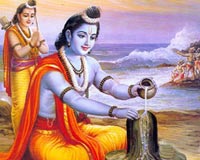 Lord
Rama, in the words of Swami Vivekananda, is "the embodiment of truth, of
morality, the ideal son, the ideal husband, and above all, the ideal king". Rama
is widely accepted to be an actual historical figure - a "tribal hero of ancient
India" - whose deeds form the great Hindu epic of Ramayana or The Romance of
Rama, written by the ancient Sanskrit poet Valmiki. According to the Hindus
belief, Rama lived in the Treta Yug. Although historians are of the conviction
that Rama was not particularly deified until the 11th century AD. Tulsidas'
wonderful version of the Sanskrit epic "Ramayana" into "Ramcharitmanas" greatly
enhanced the popularity of Rama as a Hindu god and gave rise to various
devotional groups. Lord
Rama, in the words of Swami Vivekananda, is "the embodiment of truth, of
morality, the ideal son, the ideal husband, and above all, the ideal king". Rama
is widely accepted to be an actual historical figure - a "tribal hero of ancient
India" - whose deeds form the great Hindu epic of Ramayana or The Romance of
Rama, written by the ancient Sanskrit poet Valmiki. According to the Hindus
belief, Rama lived in the Treta Yug. Although historians are of the conviction
that Rama was not particularly deified until the 11th century AD. Tulsidas'
wonderful version of the Sanskrit epic "Ramayana" into "Ramcharitmanas" greatly
enhanced the popularity of Rama as a Hindu god and gave rise to various
devotional groups.
Virtues of Rama
Shri Rama was a paragon of virtues. Rama was not only kind and affectionate but
generous and considerate of feelings for all around him. Lord Rama had a
marvelous physique and captivating manners. Shri Ram had a magnanimous
personality. He was extremely noble, generous, chivalrous and fearless. He was
very simple and absolutely free from flamboyance.
Lord Rama is considered as a son unequalled in the world, and resembled
Dasaratha in each and every aspect of good qualities. He never spoke a lie
throughout his life. He always offered respect to the scholars and the elders,
people loved him and he adored the people. His body was transcendental and
outstanding. He was eloquent, attractive and adjustable to circumstances. He
knew the heart of each and every human being on the earth (being omniscient). He
had all the conceivable qualities of a king's son and was dear to the people as
their own hearts.
Lord Rama was endowed with incredible transcendental qualities. The earth
personified adored him, who was possessor of such virtues, who was indomitable,
who was brave, and who was the unequalled Lord of all. To put succinctly, Sri
Rama's life was a life of holy compliance, of stainless purity, of matchless
simplicity, praiseworthy contentment, commendable self-sacrifice and remarkable
renunciation.
Legend of Lord Rama
As per the widespread legends, Lord Rama is considered as the seventh
incarnation of Lord Vishnu, who took an Avatar to annihilate the demon king
Ravana. Rama is known for his stainless personality and matchless simplicity.
Shri Ram is one of the popular gods of Hindu religion. He was effulgent like the
sun, in forgiveness like the earth, in intelligence like Brihaspati, in frame
like Vasava, in prowess like Indra.
Victory of Rama - The Legend
The stories and glorious deeds of Lord Rama are renowned throughout the world.
Here we will discuss the story of victory of Rama over Ravana, the demon.
According to Ramayana, Diwali celebrates the return of Ram, an incarnation of
Lord Vishnu and the eldest son of King Dasharath of Ayodhya, from his 14-year
exile with Sita and Lakshman after killing the Ravan, a demon king. The people
of Ayodhya lighted the kingdom with earthen diyas (oil lamps) and fireworks to
celebrate the return of their king. The legend of Rama says, Lord Rama was the
seventh incarnation of Lord Vishnu. He was a great warrior King. His father
Dashratha, the King of Ayodhya sent him to exile along with his wife Sita and
his younger brother Lakshman, on his wife's (Kaikeyi) insistence. After 14 years
of exile, in which he puts an end to the demon Ravana, Lord Rama returned to his
Kingdom Ayodhya.
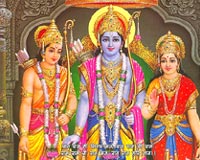 Ravana
caged Sita and enforced her to marry him but she didn't agree to this. Lord Rama
with the help of Hanuman, Sugreev and Bali and their "Vaanar Sena" attacked
Lanka and after a severe battle, got Sitaji released from the control of Ravana.
After this victory of Good over Evil, Rama returned to Ayodhya. Ravana
caged Sita and enforced her to marry him but she didn't agree to this. Lord Rama
with the help of Hanuman, Sugreev and Bali and their "Vaanar Sena" attacked
Lanka and after a severe battle, got Sitaji released from the control of Ravana.
After this victory of Good over Evil, Rama returned to Ayodhya.
According to the legend, people welcomed them by lighting rows of clay lamps in
Ayodhya. Great celebrations were held and everyone was happy for Rama to be the
King of Ayodhya. This celebration took place on the night of the new moon of
Ashwin (October-November). From that day onwards; people celebrate this occasion
as the most delightful festival of India and of the Hindu Religion. Even today
Diwali celebration means -happiness, fireworks and sweets.
Thus the festival of diwali is an honour of Rama's victory over Ravana.
Various Names of Lord Rama
Lord Rama is the one of the commonly worshipped gods of the Hindu religion.
Shri Ram is recognized as the seventh incarnation (Avatar) of Lord Vishnu, the
preserver of the Universe. Lord Ram is known for his virtues. Ram is the great
lord of Hanuman, the ultimate disciple. Sri Ram is also known as Maryada
Purushottam Ram because he is the epitome of righteousness. Lord Rama is
considered as the perfect man, due to the fact that he makes a perfect son, a
perfect husband, a perfect king and a perfect brother. Lord Rama is known by
many different names. This list contains 108 names of Lord Rama with their
meanings:Lord Rama is the one of the commonly worshipped gods of the Hindu
religion. Shri Ram is recognized as the seventh incarnation (Avatar) of Lord
Vishnu, the preserver of the Universe. Lord Ram is known for his virtues. Ram
is the great lord of Hanuman, the ultimate disciple. Sri Ram is also known as
Maryada Purushottam Ram because he is the epitome of righteousness. Lord Rama
is considered as the perfect man, due to the fact that he makes a perfect son,
a perfect husband, a perfect king and a perfect brother. Lord Rama is known by
many different names. This list contains 108 names of Lord Rama with their
meanings:
|
Name |
Meaning |
|
Om Shri Ramaya Namaha |
The Giver of happiness |
|
Om Ramabhadraya Namaha |
The Auspicious One |
|
Om Ramachandraya Namaha |
Moon like Gentle |
|
Om Shashvataya Namaha |
The ever-lasting one |
|
Om Rajivalochanaya Namaha |
The Lotus-eyed |
|
Om Shrimate Namaha |
The Abode of Lakshmi |
|
Om Rajendraya Namaha |
The King of the Kings |
|
Om Raghupungavaya Namaha |
The Scion of the Raghu dynasty |
|
Om Janaki Vallabhaya Namaha |
The Consort of Janaki |
|
Om Jaitraya Namaha |
The Triumphant |
|
Om Jitamitraya Namaha |
The Conqueror of His Foes |
|
Om Janardhanaya Namaha |
The Refuge of the people |
|
Om Vishvamitra Priyaya Namaha |
The Beloved of Sage Vishvamitra |
|
Om Dantaya Namaha |
The Unperturbed |
|
Om Sharanatrana Tatparaya Namaha |
The One who is Determined To Protect His Devotees |
|
Om Bali Pramathanaya Namaha |
The Slayer of Bali |
|
Om Vagmine Namaha |
The Spokesman |
|
Om Satyavache Namaha |
The Speaker Of Truth |
|
Om Satyavikramaya Namaha |
The One who is Truthfully Powerful |
|
Om Satyavrataya Namaha |
The One of truthful vows |
|
Om Vratadharaya Namaha |
The One who is Practising Penance |
|
Om Sada Hanumadashritaya Namaha |
The One who is always served by Hanuman |
|
Om Kausaleyaya Namaha |
The Son of Kausalya |
|
Om Kharadhvamsine Namaha |
The Slayer of the demon Khara |
|
Om Viradha Vanapanditaya Namah |
The Slayer of the demon Viradha |
|
Om Vibhishana Paritratre Namaha |
The Protector of Vibhishana |
|
Om Kodanda Khandanaya Namaha |
The One who broke the mighty bow |
|
Om Saptatala Prabhedre Namaha |
The One who Broke the Seven Tale Trees |
|
Om Dashagriva Shiroharaya Namaha |
The Slayer Of Ten-Headed Ravana |
|
Om Jamadagnya Mahadarpaya Namaha |
The destroyer of Jamadagni's Son's Arrogance |
|
Om Tatakantakaya Namaha |
The Slayer of Tataka |
|
Om Vedanta Saraya Namaha |
The Essence of Vedanta |
|
Om Vedatmane Namaha |
The Spirit of the Vedas |
|
Om Bhavarogasya Bheshajaya Namaha |
The Reliever Of Earthly Ailments |
|
Om Dushanatri Shirohantre Namaha |
The Slayer Of Dooshanatrishira |
|
Om Trigunatmakaya Namaha |
The Source of the three gunas |
|
Om Trivikramaya Namaha |
The Conqueor Of The Three Worlds |
|
Om Trilokatmane Namaha |
The Lord Of The Three Worlds |
|
Om Punyacharitra Kirtanaya Namah |
The One whose story is a source of merit to those who sing it |
|
Om Triloka Rakshakaya Namaha |
The Protector of the three worlds |
|
Om Dhanvine Namaha |
The wielder of the bow |
|
Om Dandakaranya Kartanaya Namaha |
The Dweller in the Dandaka forest |
|
Om Ahalya Shapashamanaya Namaha |
The Reliever of Ahalya's curse |
|
Om Pitru Bhaktaya Namaha |
The Worshipper of father Dasaratha |
|
Om Vara Pradaya Namaha |
The giver of boons |
|
Om Jitendriyaya Namaha |
The Conqueror of the senses |
|
Om Jitakrodhaya Namaha |
The Conqueror of anger |
|
Om Jitamitraya Namaha |
The One who wins over friends |
|
Om Jagad Gurave Namaha |
The Guru of the world |
|
Om Riksha Vanara Sanghatine Namaha |
The Saviour Of Boars And Monkeys |
|
Om Chitrakuta Samashrayaya Namaha |
The Lord who took refuge at Chitrakuta Hill |
|
Om Jayanta Trana Varadaya Namaha |
The Lord who blessed Jayanta |
|
Om Sumitra Putra Sevitaya Namaha |
The Lord who is served by Sumitra's son (Lakshmana) |
|
Om Sarva Devadhi Devaya Namaha |
The Lord of all the gods |
|
Om Mritavanara Jivanaya Namaha |
The reviver of dead monkeys |
|
Om Mayamaricha Hantre Namaha |
The Destroyer of the demon Maricha |
|
Om Mahadevaya Namaha |
The Great Lord |
|
Om Mahabhujaya Namaha |
The Lord of mighty arms |
|
Om Sarvadeva Stutaya Namaha |
The Lord who is praised by all the gods |
|
Om Saumyaya Namaha |
The Calm One |
|
Om Brahmanyaya Namaha |
The Absolute Reality |
|
Om Muni Samstutaya Namaha |
The Lord who is praised by sages |
|
Om Mahayogine Namaha |
The Great Yogi |
|
Om Mahadaraya Namaha |
The Noble One |
|
Om Sugrivepsita Rajyadaye Namaha |
The Lord who returned the kingdom to Sugriva |
|
Om Sarva Punyadhi Kaphalaya Namaha |
The Giver of fruits of pious work, good karmas |
|
Om Smrita Sarvagha Nashanaya Namaha |
The Remover of all afflictions |
|
Om Adipurushaya Namaha |
The Primal Being |
|
Om Paramapurushaya Namaha |
The Supreme Being |
|
Om Mahapurushaya Namaha |
The Great Being |
|
Om Punyodayaya Namaha |
The Source of all blessings |
|
Om Dayasaraya Namaha |
The Embodiment of compassion |
|
Om Purana Purushottamaya Namaha |
The Most Ancient Person |
|
Om Smita Vaktraya Namaha |
The One who smiling speaks |
|
Om Mita Bhashine Namaha |
The One of moderate speech |
|
Om Purva Bhashine Namaha |
The One who rarely speaks |
|
Om Raghavaya Namaha |
The scion of the Raghu dynasty |
|
Om Ananta Gunagambhiraya Namaha |
The Lord of infinite majestic qualities |
|
Om Dhirodatta Gunottamaya Namaha |
The Lord of Valorous qualities |
|
Om Maya Manusha Charitraya Namaha |
The Lord who incarnated as a man through His maya |
|
Om Mahadevadi Pujitaya Namaha |
The Lord who is worshiped by Lord Shiva |
|
Om Setukrite Namaha |
The builder of the bridge |
|
Om Sarva Tirthamayaya Namaha |
The Lord who is the sum of all holy places |
|
Om Haraye Namaha |
The Destroyer |
|
Om Shyamangaya Namaha |
The Dark-complexioned One |
|
Om Sundaraya Namaha |
The Beautiful One |
|
Om Shooraya Namaha |
The Valiant |
|
Om Pitavasase Namaha |
The Lord clad in yellow raiment |
|
Om Dhanurdharaya Namaha |
The Bearer of the bow |
|
Om Sarva Yajnadhipaya Namaha |
The Lord of sacrifice |
|
Om Yajvine Namaha |
The Sacrificer |
|
Om Jaramarana Varjitaya Namaha |
The Conqueror of birth and death |
|
Om Vibhishana Pratishthatre Namaha |
The Lord who crowned Vibhishana on the throne |
|
Om Sarvabharana Varjitaya Namaha |
The Lord who relinquished all adornment |
|
Om Paramatmane Namaha |
The Supreme Self |
|
Om Parabrahmane Namaha |
The Supreme Godhead |
|
Om Sachidananda Vigrahaya Namaha |
The Form of Eternal Bliss |
|
Om Parasmai Jyotishe Namaha |
The Supreme Light |
|
Om Parasmai Dhamne Namaha |
The Supreme Abode |
|
Om Parakashaya Namaha |
The Supreme Space |
|
Om Paratparaya Namaha |
The Supreme beyond the highest |
|
Om Pareshaya Namaha |
The Supreme Lord |
|
Om Parakaya Namaha |
The Uplifter Of The Poor |
|
Om Paraya Namaha |
The Supreme Being |
|
Om Sarva Devatmakaya Namaha |
The Lord who is the Source of all gods |
|
Om Parasmai Namaha |
The Supreme Lord |
Vishnu
|
Characteristics : |
Protector, Preserver |
|
Other Names : |
Narayan, Adinath, Hrishikesh, Badrinath |
|
Principal Scriptures : |
Vishnu Purana, Vishnu Sahasranama |
|
Consort : |
Lakshmi, The Goddess of Wealth |
|
Abode : |
Vaikuntha |
|
Mount (Vahana) : |
Garuda (The Eagle Bird) |
|
Weapon : |
Chakra and Gada (mace) |
|
Mula Mantra : |
Om Namo Bhagwate Vasudevaya |
|
Vishnu Gayatri Mantra: |
Om Narayanaya Vidmahee
Vasudevaya Dheemahi
Tanno Vishnu Prachodayaat |
Lord Vishnu is considered as the chief god in Hindu religion and Indian
mythology. Vishnu, the preserver, forms the part of the trinity while the other
two being Brahma and Shiva, respectively, as the creator and destroyer of the
universe. It is believed that Vishnu is an eternal and universal spirit
associated with the primeval waters that pervaded before the creation of the
universe.
Vishnu - The Name
Lord Vishnu is known by numerous names and a thousand names are given in the
book '' Vishnu Sahasranama''. The name Vishnu has its roots in a Sanskrit word
'Vish ', which means to pervade. God Vishnu is all pervading but known more by
the avatars (incarnation) he took on the earth.
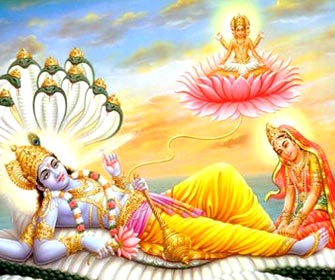 Vishnu
- the Preserver Vishnu
- the Preserver
To understand the concept of Vishnu being the preserver of the world, one has to
understand the two beliefs of Hinduism. The first is that men attain salvation
by faithfully following predetermined paths of duty. The Second is that powers
of good and evil (gods and demons) are in regular controversy to rule over the
world. It is believed that whenever evil prevails over good in order to win,
Vishnu comes down to earth in some mortal form to save righteousness. As per the
Puranas, Vishnu is not allowed to interfere in the situations directly. So, he
takes different avatar and act in manners that will re-establish proper balance
between good and evil.
Vishnu - The Image
According to numerous Purana, Vishnu is the ultimate omnipresent reality. Still,
he is depicted as a four-armed male-form indicating his all-powerful and
all-pervasive nature. The skin color is new-cloud-like-blue which indicates his
all-pervasive nature, blue being the color of the infinite sky as well as the
infinite ocean on which he resides. Vishnu has the mark of sage Bhrigu's feet
and the srivatsa mark, symbolizing his consort Lakshmi, on his chest. A crown
decorates his head symbolizing his supreme authority. He rests on Ananta, the
immortal and infinite snake.
Avatars of Vishnu
Lord Vishnu is prominent as the Preserver of the universe. Vishnu's
restoring, shielding and conserving powers have been apparent in the world in a
sequence of ten mortal incarnations known as Avatars. The avatars appear in
order to balance the effect of good and evil upon the earth. It is believed that
nine avatars have already descended, three in non human form, one in hybrid form
and five in human form. Of the ten universally recognized avatars, nine have
already appeared whereas the tenth is yet to appear. These ten avatars are also
known by the name of Dasha Avatar of Vishnu.
All the Avatars are mortal form of Lord Vishnu, who himself is eternal,
consistent and undeniable. The Dasha Avatar of Vishnu are briefly discussed
here:
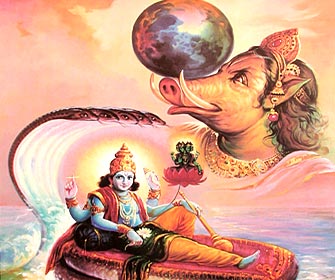 Matsya
Avatar - Lord Vishnu in the form of Fish Matsya
Avatar - Lord Vishnu in the form of Fish
The first avatar, Matsya, was taken by Lord Vishnu at the end of the Satyuga
(last age), when a flood destroyed the world. Through this avatar, he saved
humanity and the sacred Veda text from the flood.
Kurma Avatar - Lord Vishnu in the form of Turtle
The second avatar, Kurma, was taken in the Satyuga (last age) to help the Devas
and to obtain the amrut (nectar) of immortality which was also sought after by
the Asuras (demons). He helped in creating the world by giving support of his
back through this avatar.
Varaha Avatar - Lord Vishnu in the form of Boar
The third avatar, Varaha, was taken at the end of the last flood in the Satyuga,
when Bhoomi Devi (Earth Mother) sank to the bottom of the ocean. Vishnu, in the
form of varaha, dived into the ocean and raised the goddess out of the ocean,
supported by his two tusks.
Narsimha Avatar - Lord Vishnu in the form of Half - Man and Half - Lion
The fourth Avatar, Narsimha, was taken in the Satyuga (last age) to kill a
tyrant demon king. Narsimha is the only avatar which was Hybrid in form being
half human and half animal.
Vamana Avatar - Lord Vishnu in the form of a Dwarf
The fifth avatar, Vamana, appeared in the Tretayuga in order to destroy Bali,
the king of demons. He came during a huge ceremony conducted by the king and
cleverly asked for just three feet of land, measured by his own small feet.
Vamana covered whole of the earth and the heaven, subduing Bali into his feet.
Parshurama Avatar - Lord Vishnu in the form of a Brahmin
The sixth avatar, Parshurama, appeared in the Tretayuga to destroy the warrior
caste. When the kings of the earth became despotic and started to harm people
and saints in the forest, Vishnu incarnated as Parshurama and destroyed all the
kings who were harassing the people.
Rama Avatar - Lord Vishnu in the form of the King
The seventh avatar, Rama, the prince and king of Ayodhaya, appeared in the
Tretayuga, to rescue Sita with his loyal servant Hanuman and his brother,
Lakshmana, and killed the demon Ravana. Lord Rama became one of the most popular
gods in the Hindu religion.
Krishna Avatar - Lord Vishnu in the form of a Cowherd's Boy
The eighth avatar, Krishna, along with his brother Balarama, appeared in the
Dwaparyuga to kill the demon king, Kansa. Lord Krishna conveyed the message of
love and humanity to the world. Krishna told the epic poem Bhagavad Gita to the
warrior Arjuna ,in which he acclaimed : ''Whenever Dharma, or the situation of
law and order, is endangered on this world, I incarnate onto this world to re
establish Dharma, law and order, and to protect the Sadhus or saints and to
destroy the evil elements of the society.''
Buddha Avatar - Lord Vishnu in the Form of Buddha
The ninth avatar, Mahavira Buddha, appeared in the Kalyuga, to teach the lesson
of following a middle path in life. ''Buddha'' means 'the enlightened one'. He
taught that all sorrow comes from attachments and desires, so it's better to
curb all attachments in order to remain happy.
Kalki Avatar - Lord Vishnu in the form of Horse
The tenth Avatar, Kalki, ("Eternity", or "time", or "The Destroyer of
foulness"), is yet to appear on the earth. And it is expected to appear at the
end of Kali Yuga, the time period in which we currently exist, which will end in
the year 428899 CE.
Bhairav
Lord Bhairav is considered to be the incarnation (Avatar) of Lord Shiva. In
the contemporary times, Bhairon has been worshipped by millions of people to
get the powerful blessings from the god. Bhairav is a fierce form of Shiva. It
is believed that Bhairon is connected to the Southern face and relates to the
Mahavidya goddess named Bhairavi who gives Lagna shuddhi (purification of the
Disciple). This purifies and protects the body, self concept, personality, and
other attributes associated with the Disciple.
Bhairon- Lord of Rahu
Bhairav or Bhairavi are worshipped when there are malefic planets in the birth
lagna (time) or when natural malefic planets are transiting. Bhairon removes
and protects person from these types of effects. As per the Indian astrology,
Rahu is known as a shadow planet, which plays an important role in the life of
a creature. The Indian astrologers often suggest people, the worship of Lord
Bhairav to reduce the evils caused by the malefic position of Rahu in the
horoscope.
Bhairon - The Lord of Yogis
Lord Bhairav is worshipped by Yogis and Tantriks to gain Siddhis. Bhairon is
regarded as the guardian of Yogis and Tantriks who attain accomplishment of
Mantras by doing Sadhana (devotion).
Bhairon - The Kotwal
Lord Bhairav guards the temple of Lord Shiva and due to this fact, he is also
known as "kotwal" (Guard).
Bhairav - The Worship
Worship of Lord Bhairon is very useful to win over your enemies, success and
all materialistic comforts. It is very easy to please lord Bhairav by doing
normal worship daily. Coconut, Flowers, Sindoor, Mustard oil, black til etc
are offered to the God and the following mantra is chanted with devotion to
get God's Blessings.
Main (Mula) Mantra :
"OM BATUK BHAIRVAYE NAMHA"
Brahma
|
Characteristics : |
Creator, Generator |
|
Other Names : |
Nabhija, Hiranyagarbha, Kanja |
|
Consort : |
Saraswati |
|
Abode : |
Brahmaloka |
|
Weapon : |
Brahmastra |
|
Vahana (Vehicle) : |
Swan |
|
Brahma Gayatri Mantra: |
Aum Parmeshwaraye Vidmahe
Paratattvaye Dheemahi
Tanno Brahma Prachodayat |
Brahma - The Creator
Brahma is considered as the first god of the Hindu Trinity, the other being
Vishnu and Shiva. Lord Brahma is recognized as the creator of the Universe.
Brahma is regarded as the Supreme Being, the god of gods. Lord Brahma is the
originator and the generator of the mankind. Brahma symbolizes the universal
mind, as creation is the work of the mind and the intellect. If we consider
this, from an individual's point, Brahma represents one's own mind and
intellect. As an individual is god gifted with the mind and intellect, then it
may be assumed that a person has already attained Brahma.
This could be the possible reason that worship of Brahma is not so popular among
the Hindu people. However, he is worshipped by seekers of knowledge, such as
students, teachers, scholars and scientists.
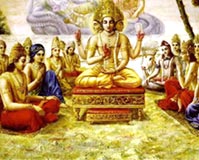 Lord Brahma - The Image
Lord Brahma - The Image
Hindu God Brahma can be seen as a four-faced, four-armed, bearded deity. He
carries a rose and a book in the upper hand; a water pot (Kamandala) in the
lower hand and one hand is always there to bestow grace. The four faces
represent the holy knowledge of the four Vedas (Riga, Yajur, Sama and Atharva).
It symbolizes that Brahma is the foundation of all the knowledge required for
the creation of the universe. The four arms represent the four directions and
therefore symbolize that Lord Brahma is the omnipresent and the omnipotent.
The white beard conveys wisdom and the long beard gives the idea that creation
is a never-ending process. The crown on the head of Brahma implies that the Lord
has the supreme power and authority over the process of creation. Brahma sitting
on a lotus represents the creative power of the Supreme Reality. The white color
of his clothes symbolizes purity.
As per the Hindu mythology, a swan is possessed with an exceptional discerning
sense, which enables it to distinguish pure milk from a mixture of milk and
water. Brahma uses the swan as a vehicle, which is known for its discerning
abilities. This conveys the idea that, there is only one Supreme Reality from
which the entire universe emanates.
Surya
|
Mula Mantra : |
Om Suryaye Namah |
|
Surya Gayatri Mantra: |
Aum Bhaskaraye Vidmahe
Divakraraye Dheemahi
Tanno Suryah Prachodayat |
As per the Hindu Religion, Surya symbolizes the Sun God. Surya is considered
as the only visible form of God that can be seen every day. God Surya is
regarded as an aspect of Shiva and Vishnu by Shaivites and Vaishnavas
respectively. Surya is also known as Surya Narayana. Surya, the Sun God is also
acknowledged as one of the eight forms of Lord Shiva (Astamurti). Surya is the
lord of excellence and wisdom.
Surya - The Image
The celestial body, Surya (the sun) is visible in the sky. Still according to
the Hindu beliefs, Surya is depicted as a red man with three eyes and four arms,
riding in a one wheeled chariot pulled by seven horses.
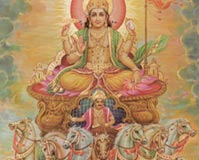 Surya
- The God of Light Surya
- The God of Light
Surya forms the major god of the Navgraha (nine planets).Surya is the God of
light as per the Vedic texts. Surya is the literal source of life. According to
the scientific fact, the whole universe is based on the process of
photosynthesis which takes place due to the presence of Surya (the sun).
God Surya - The worship
It is believed that Surya has been worshipped since ages to receive the kind
blessings of God. A simple namaskaar (folding hands) to the lord makes him
happy. Offering water to the God is too considered to receive the mercy. Surya
is believed to be a generous deity capable of curing sick people, in India. It
is also proved in Science that sunlight is a rich source of Vitamin-D. Surya is
usually remembered for the brilliance and light in one's life.
Surya - The Gayatri Mantra
The Gayatri Mantra of the Hindu Religion is also associated with the Sun God,
Surya. Aditya Hridayam is another hymn associated with Surya, recited by the
sage Agatsya to Rama on the battlefield before the fight with Ravana.
Symbol of Surya is also regarded as one of the auspicious signs of the Hindu
religion. People place the sign of the Sun over main doors as they think it
would bring them good luck.
|
 Ganesha
Image
Ganesha
Image
 Brahma,
the Creator
Brahma,
the Creator  When
Parvati came to know about this, she persuaded Shiva, to restore Ganesha to
life. Shiva ordered his servants (Gana) to bring the head of any creature that
they come across first. An elephant, the wisest of animals, appeared and became
the spontaneous donor in the head transplant of Ganesha. Shiva attached the head
of the elephant to the torso of Ganesha. After looking at the child (Ganesha),
Parvati asked Shiva that who will consider this god with the face of an
elephant.
When
Parvati came to know about this, she persuaded Shiva, to restore Ganesha to
life. Shiva ordered his servants (Gana) to bring the head of any creature that
they come across first. An elephant, the wisest of animals, appeared and became
the spontaneous donor in the head transplant of Ganesha. Shiva attached the head
of the elephant to the torso of Ganesha. After looking at the child (Ganesha),
Parvati asked Shiva that who will consider this god with the face of an
elephant.
 The
conception is clear itself by a slight balance between the opposing forces of
good and evil. When this balance gets disturbed and continuation of life becomes
unfeasible, Lord Shiva dissolves the universe. This is known as '' pralay '' and
it is done in order to create another cycle .So that the unliberated souls will
get another opportunity to liberate themselves from the bondage of the material
world. To put succinctly, Siva protects the souls from pain and suffering that
is generated by the unhealthy universe.
The
conception is clear itself by a slight balance between the opposing forces of
good and evil. When this balance gets disturbed and continuation of life becomes
unfeasible, Lord Shiva dissolves the universe. This is known as '' pralay '' and
it is done in order to create another cycle .So that the unliberated souls will
get another opportunity to liberate themselves from the bondage of the material
world. To put succinctly, Siva protects the souls from pain and suffering that
is generated by the unhealthy universe.
 With
this incident, they forgot their quarrel and decided to find its size. Vishnu
took the form of boar and went to the netherworld. Brahma assumed the form of a
Swan and flew to the skies. However both of them were unsuccessful in completing
the self-assumed tasks. At that time, Shiva appeared out of the lingam and
acknowledged that he was the progenitor of both, Brahma and Vishnu. So, he
should be worshipped in his phallic (lingam) form, and not in the
anthropomorphic form.
With
this incident, they forgot their quarrel and decided to find its size. Vishnu
took the form of boar and went to the netherworld. Brahma assumed the form of a
Swan and flew to the skies. However both of them were unsuccessful in completing
the self-assumed tasks. At that time, Shiva appeared out of the lingam and
acknowledged that he was the progenitor of both, Brahma and Vishnu. So, he
should be worshipped in his phallic (lingam) form, and not in the
anthropomorphic form. Birth
of Hanuman
Birth
of Hanuman

 Hanuman
and His Love for Eating
Hanuman
and His Love for Eating A
Great Lover - Krishna
A
Great Lover - Krishna

 Lord
Rama, in the words of Swami Vivekananda, is "the embodiment of truth, of
morality, the ideal son, the ideal husband, and above all, the ideal king". Rama
is widely accepted to be an actual historical figure - a "tribal hero of ancient
India" - whose deeds form the great Hindu epic of Ramayana or The Romance of
Rama, written by the ancient Sanskrit poet Valmiki. According to the Hindus
belief, Rama lived in the Treta Yug. Although historians are of the conviction
that Rama was not particularly deified until the 11th century AD. Tulsidas'
wonderful version of the Sanskrit epic "Ramayana" into "Ramcharitmanas" greatly
enhanced the popularity of Rama as a Hindu god and gave rise to various
devotional groups.
Lord
Rama, in the words of Swami Vivekananda, is "the embodiment of truth, of
morality, the ideal son, the ideal husband, and above all, the ideal king". Rama
is widely accepted to be an actual historical figure - a "tribal hero of ancient
India" - whose deeds form the great Hindu epic of Ramayana or The Romance of
Rama, written by the ancient Sanskrit poet Valmiki. According to the Hindus
belief, Rama lived in the Treta Yug. Although historians are of the conviction
that Rama was not particularly deified until the 11th century AD. Tulsidas'
wonderful version of the Sanskrit epic "Ramayana" into "Ramcharitmanas" greatly
enhanced the popularity of Rama as a Hindu god and gave rise to various
devotional groups.  Ravana
caged Sita and enforced her to marry him but she didn't agree to this. Lord Rama
with the help of Hanuman, Sugreev and Bali and their "Vaanar Sena" attacked
Lanka and after a severe battle, got Sitaji released from the control of Ravana.
After this victory of Good over Evil, Rama returned to Ayodhya.
Ravana
caged Sita and enforced her to marry him but she didn't agree to this. Lord Rama
with the help of Hanuman, Sugreev and Bali and their "Vaanar Sena" attacked
Lanka and after a severe battle, got Sitaji released from the control of Ravana.
After this victory of Good over Evil, Rama returned to Ayodhya. Vishnu
- the Preserver
Vishnu
- the Preserver Lord Brahma - The Image
Lord Brahma - The Image Surya
- The God of Light
Surya
- The God of Light